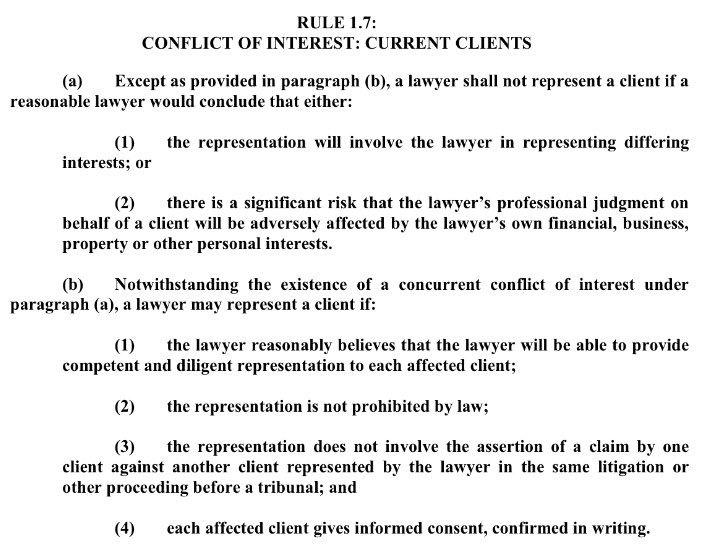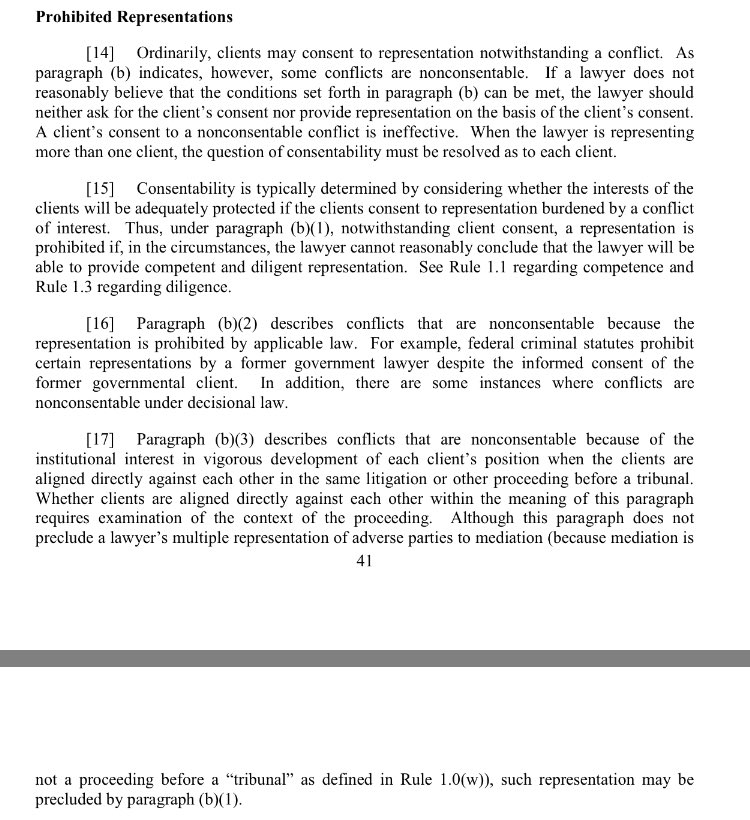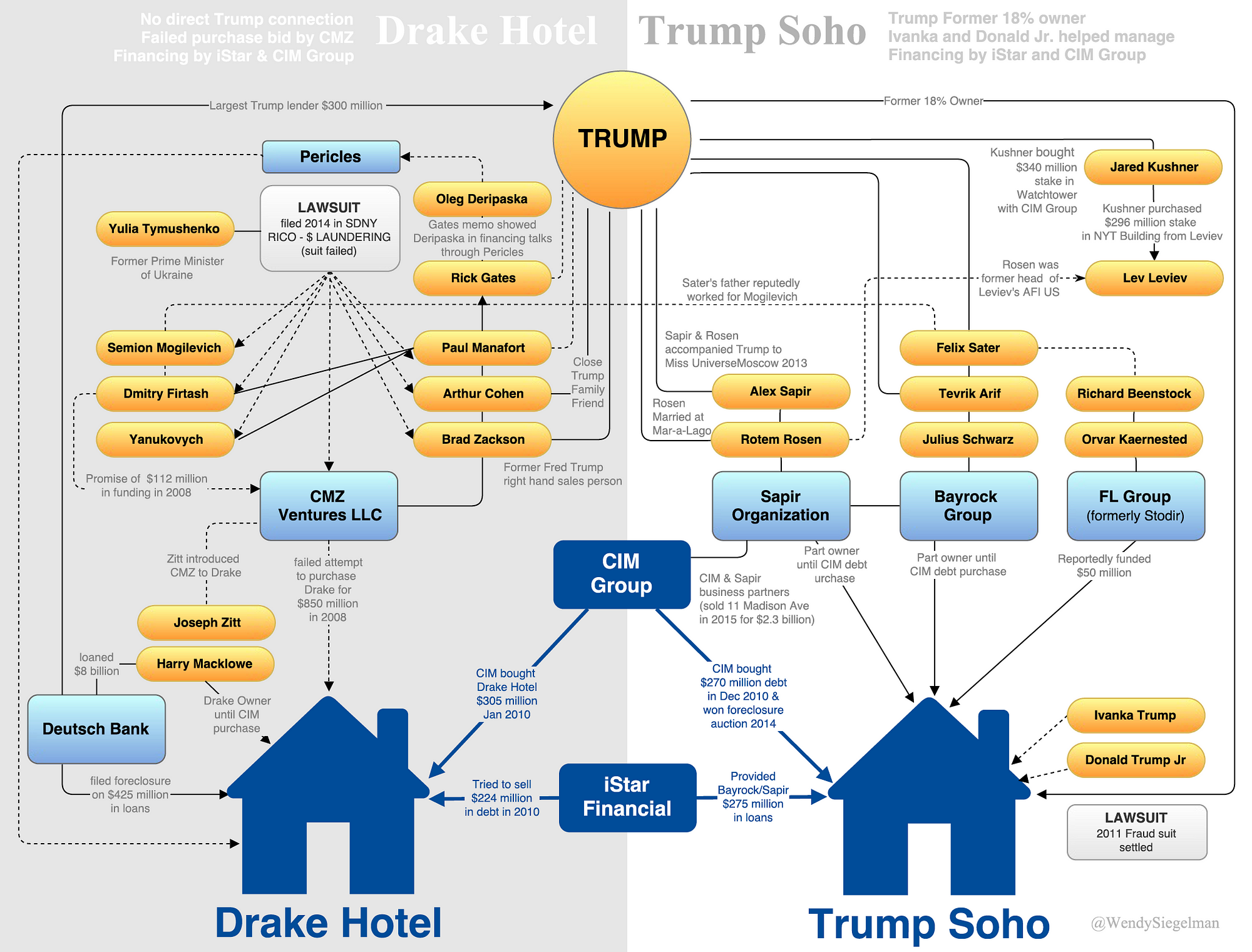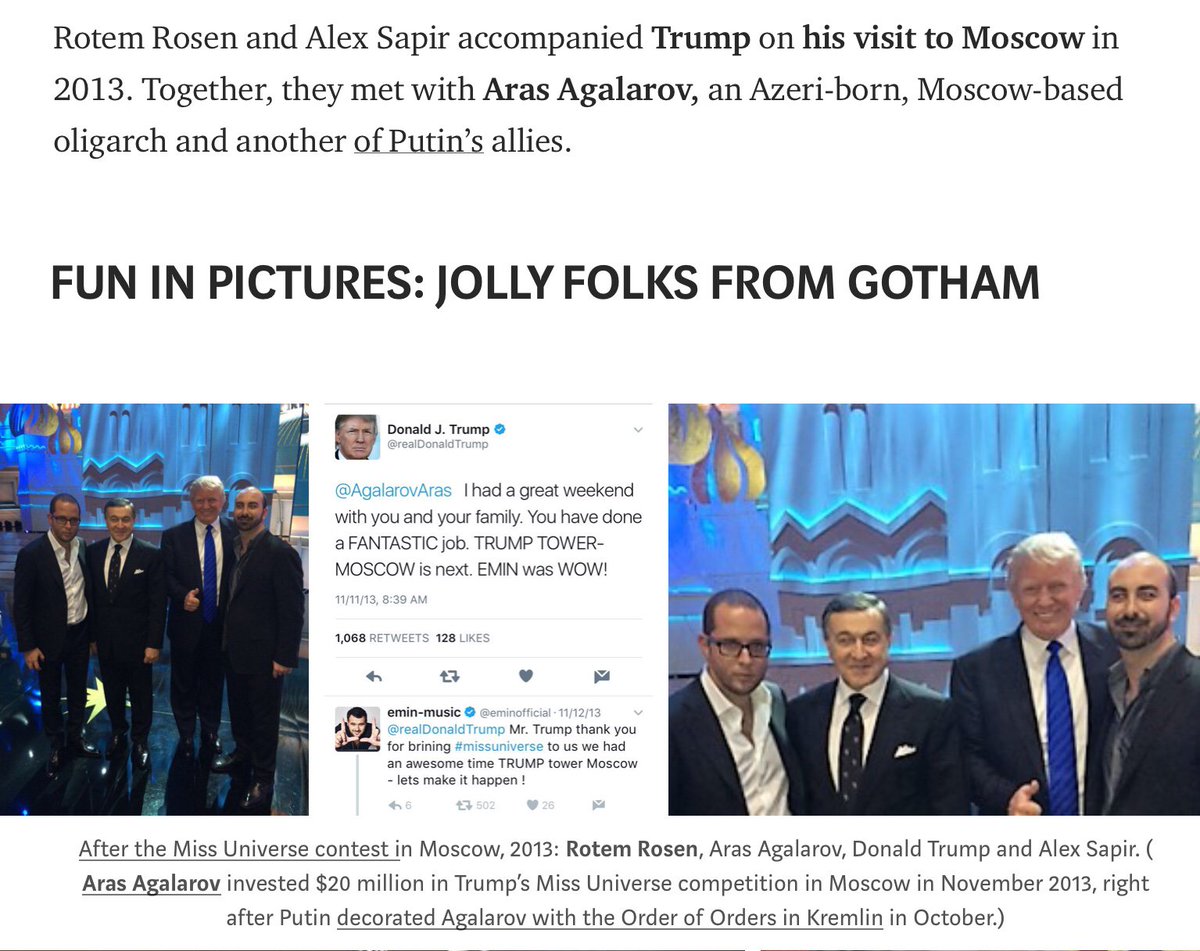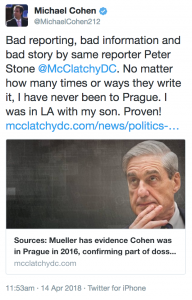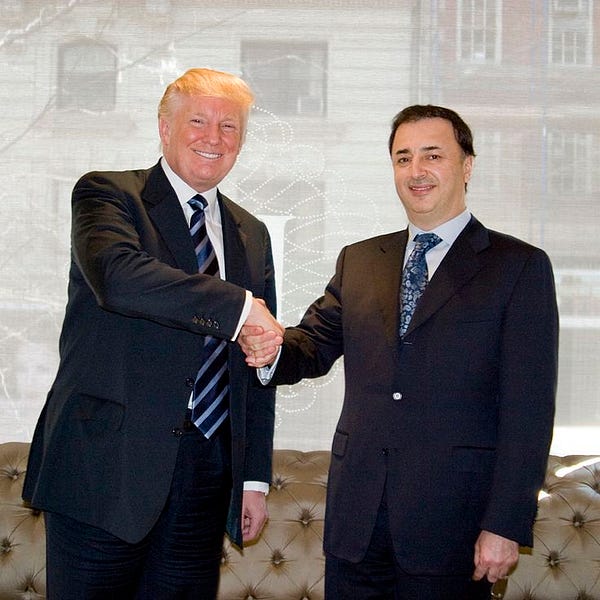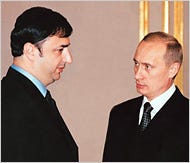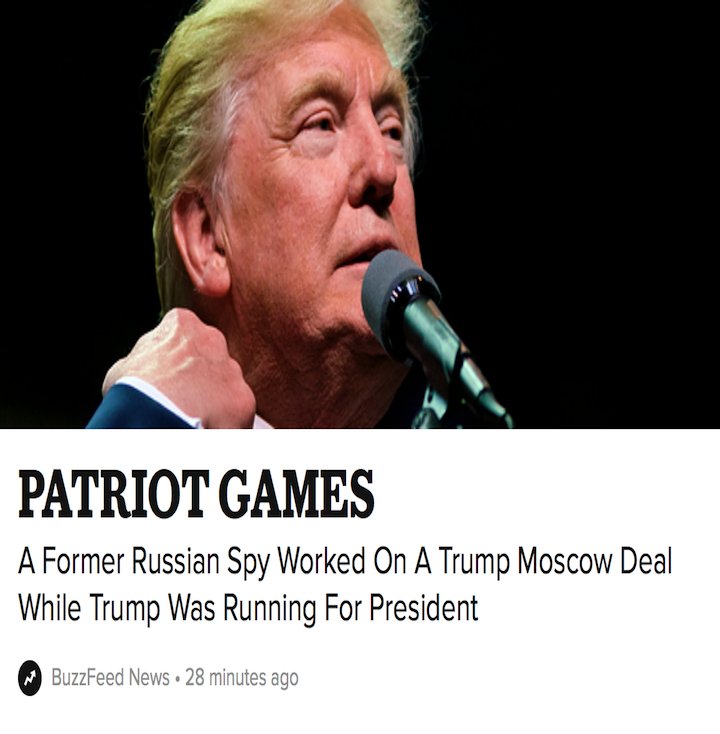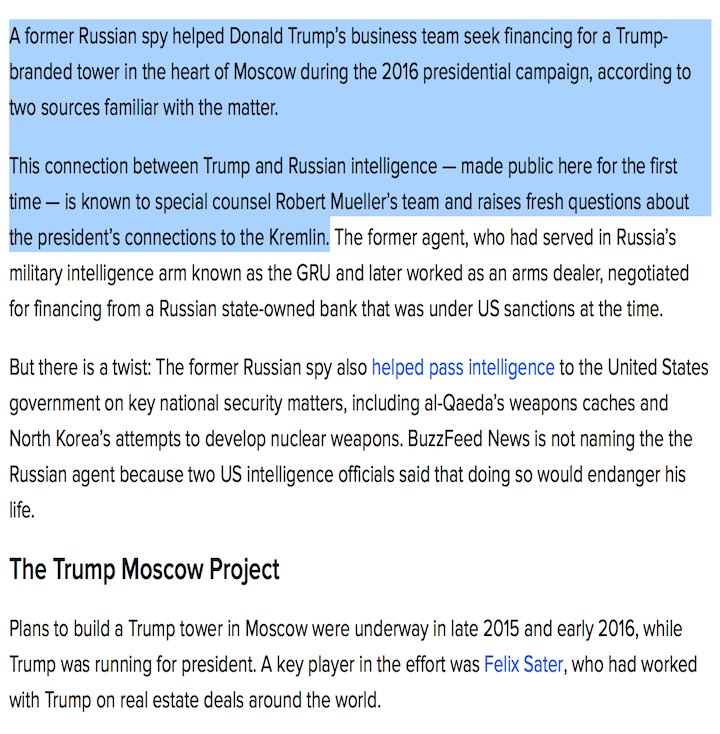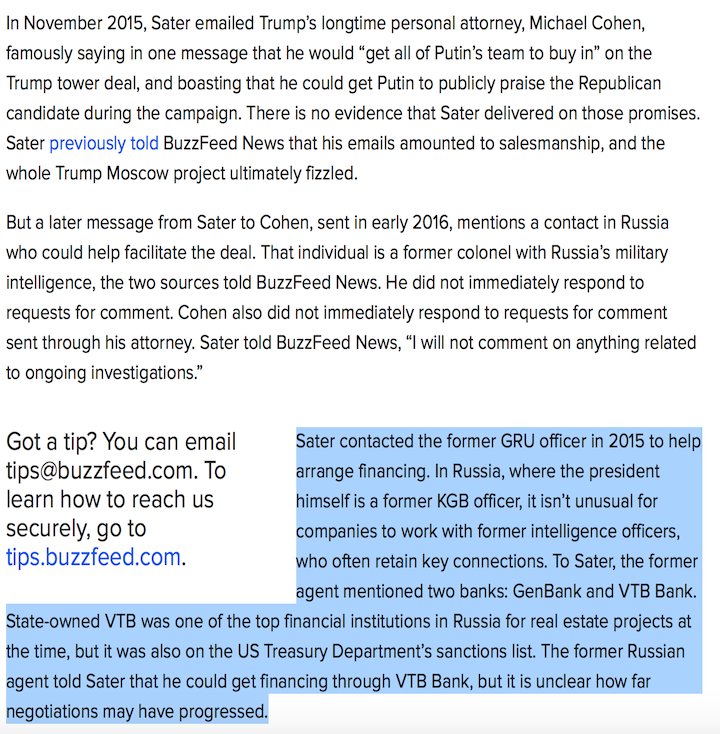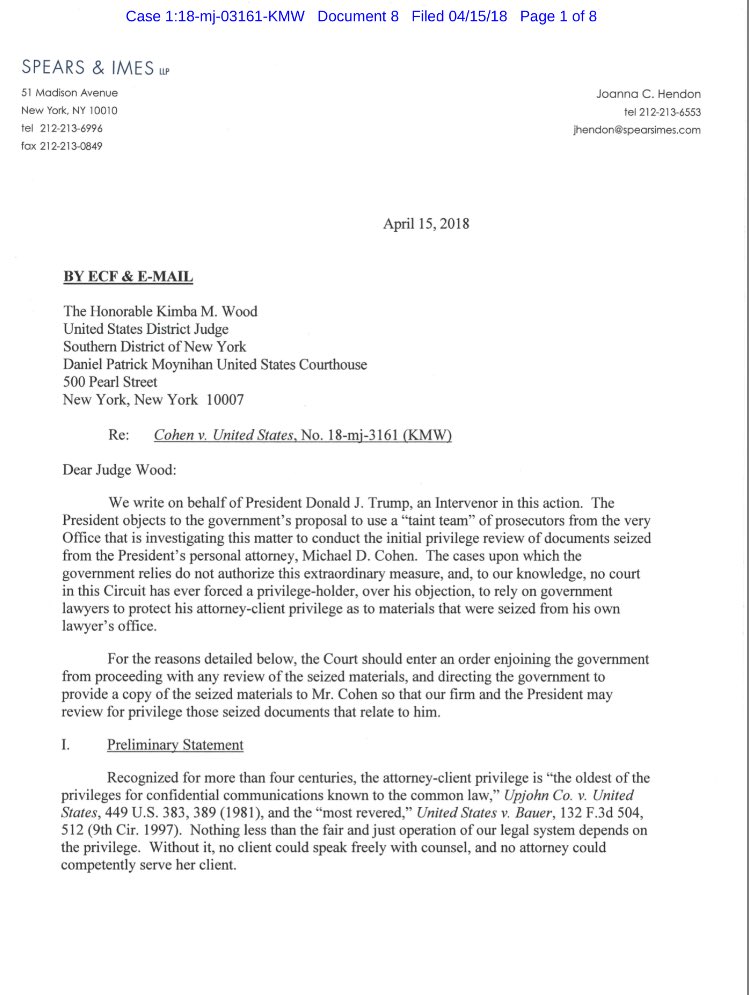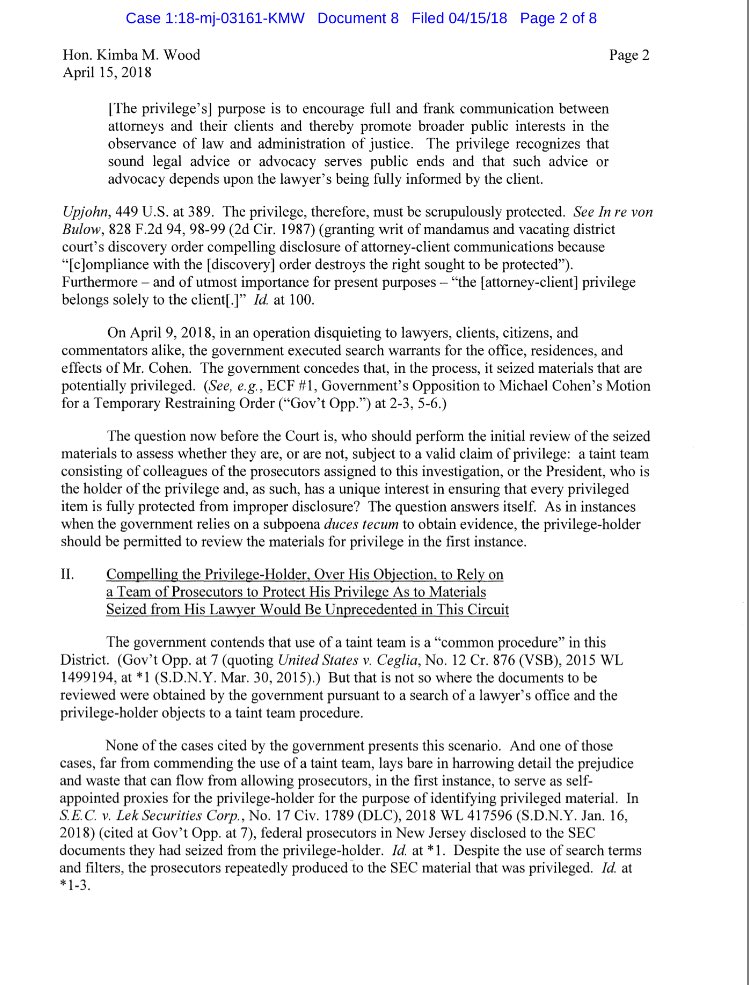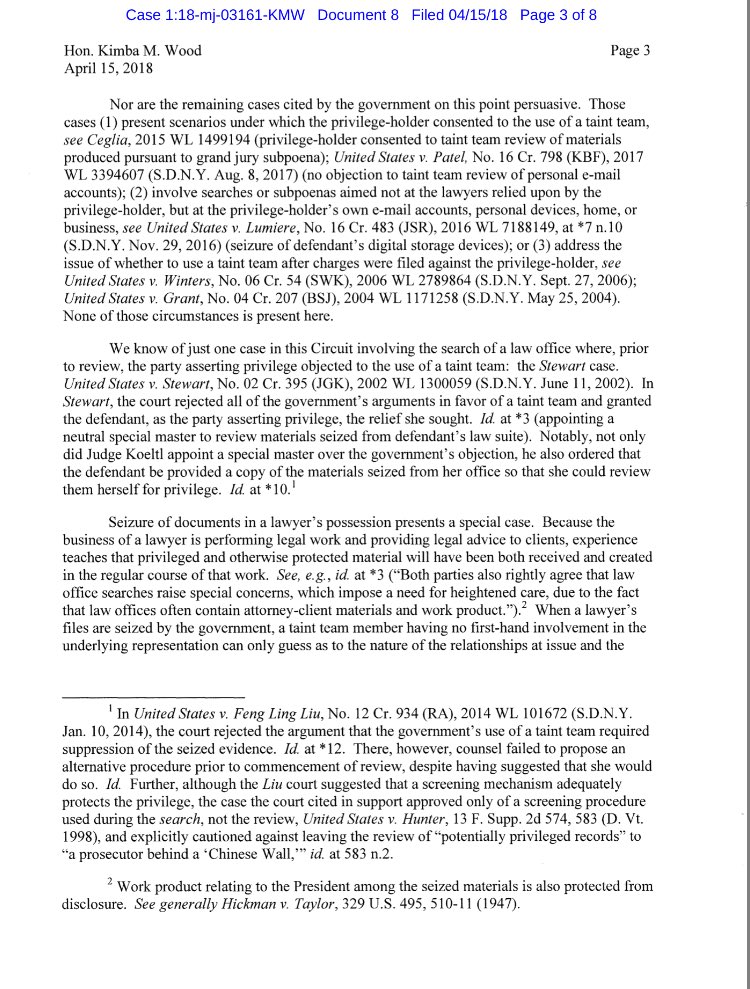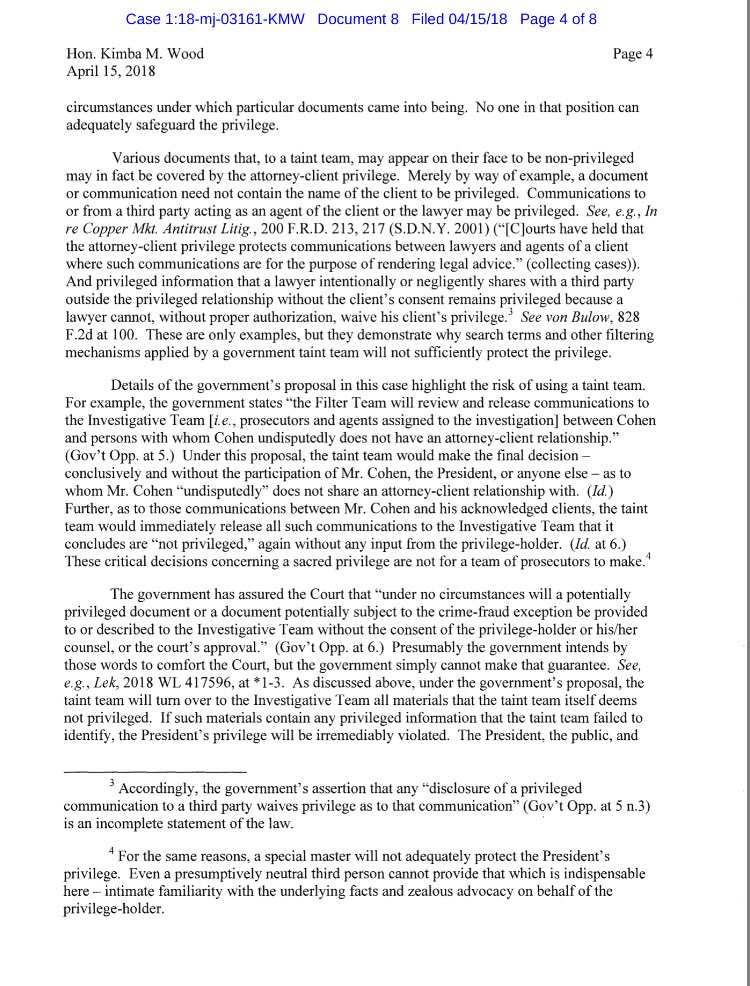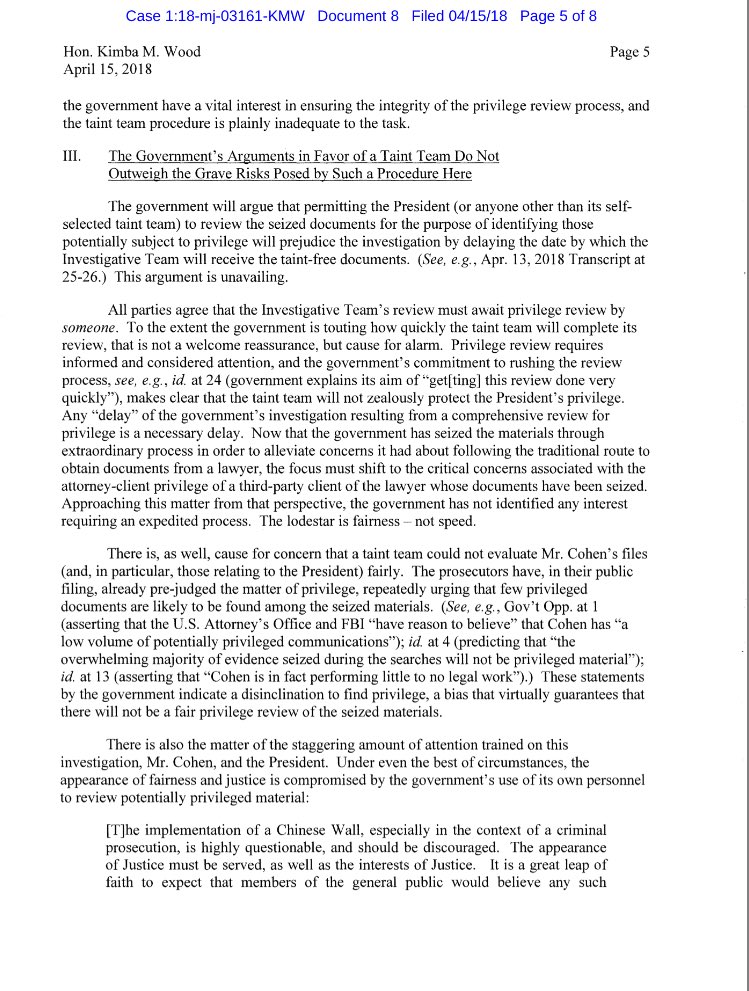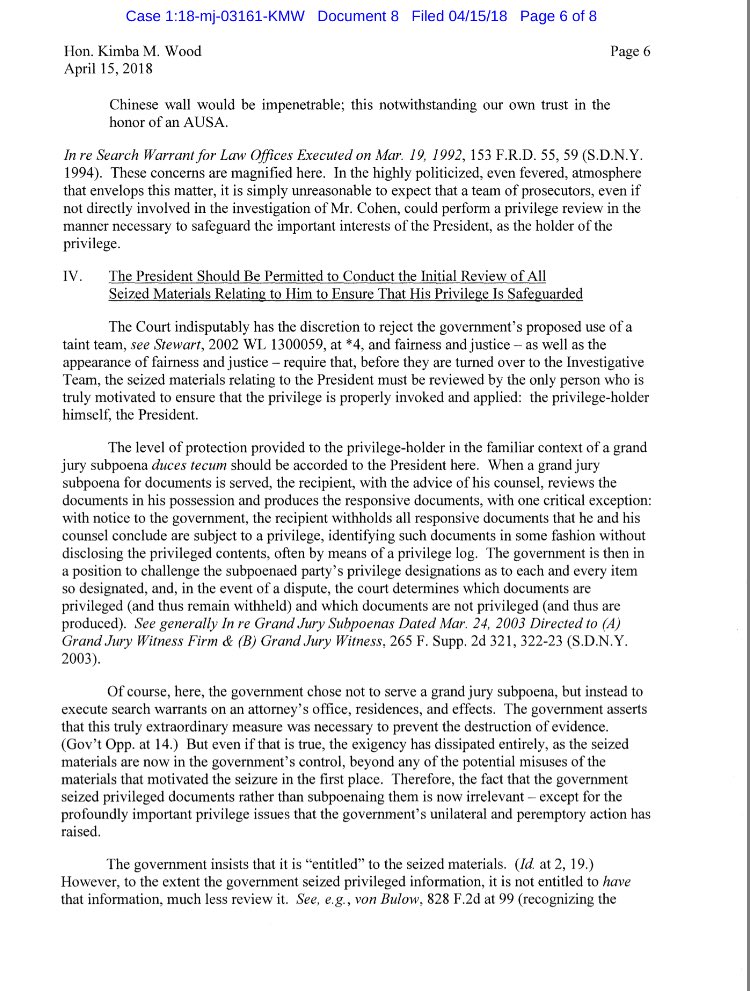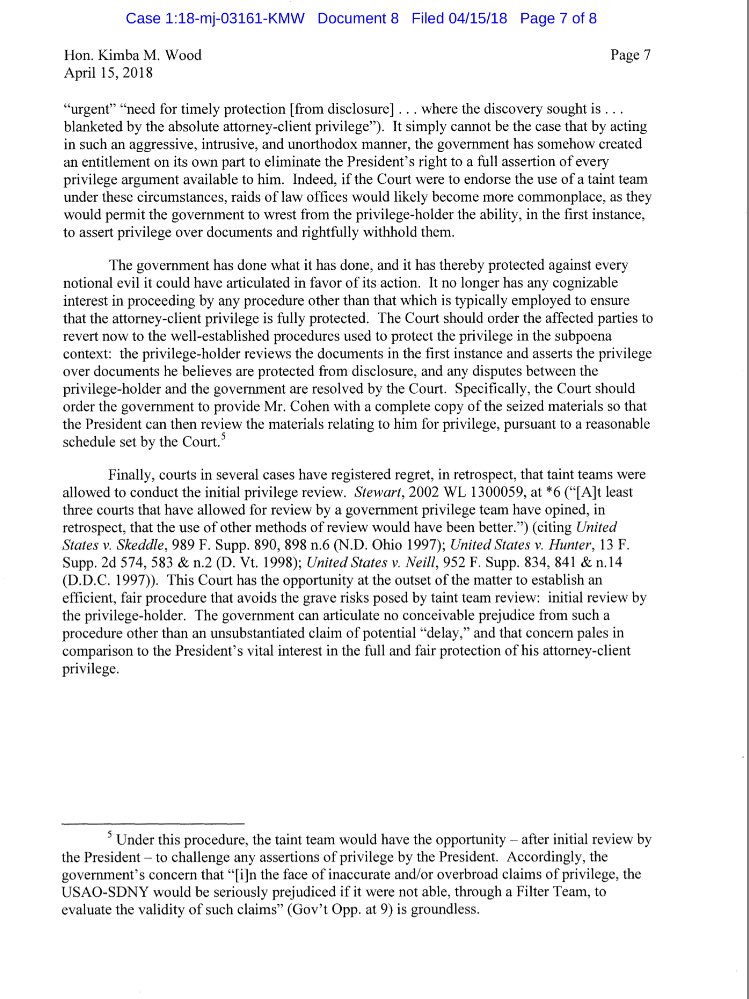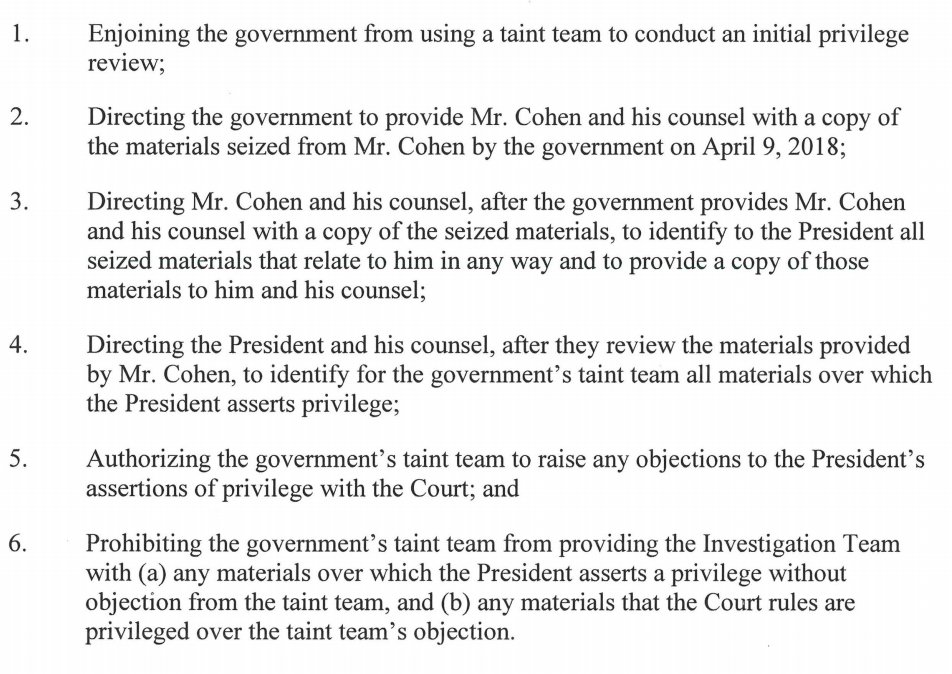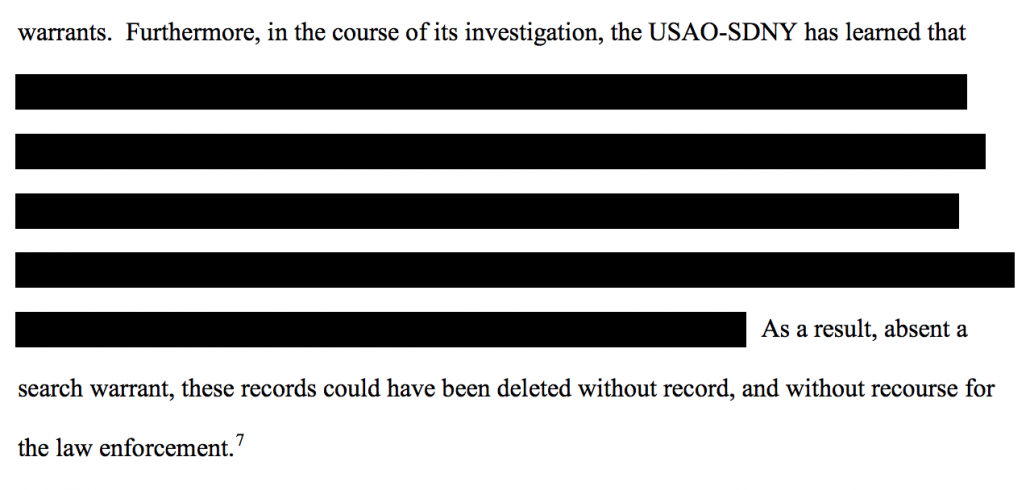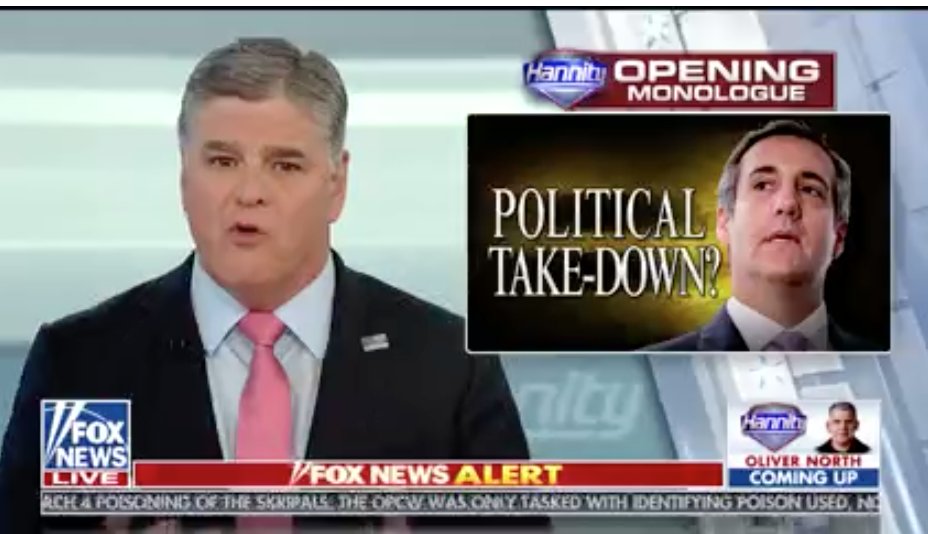Celeb Dirt To Be Sold? You Better Call KeithA profile of the lawyer behind Trump "hush" dealsAPRIL 4 --Who is Keith Davidson?
Until he negotiated financial settlements for a Playboy Playmate and a porn star who separately claimed affairs with a married Donald Trump, the Beverly Hills lawyer was a low-profile Los Angeles attorney whose solo practice operated from a small sublet office in a Wilshire Boulevard building.
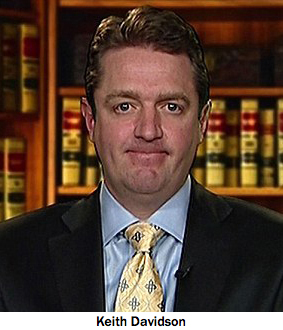
But news of the six-figure payouts Davidson arranged in the weeks before the 2016 presidential election for model Karen McDougal and adult actress Stephanie “Stormy Daniels” Clifford have stripped the 46-year-old attorney of his anonymity. Now swamped with interview requests from journalists nationwide, Davidson has watched as his professionalism has come under attack and his e-mails, retainer agreements, and billing records related to the McDougal and Clifford deals have been leaked to the press.
The payments to McDougal ($150,000) and Clifford--whose $130,000 came via Michael Cohen, Trump’s personal attorney--have prompted the filing of complaints with the Federal Election Commission that contend the hush money amounted to improper in-kind contributions to the Trump campaign. Additionally, two Democratic representatives have asked the FBI to investigate the legality of “monetary payments to silence women alleging affairs with Mr. Trump.”
Davidson is no longer counsel for McDougal or Clifford, both of whom fired him and now complain of being dissatisfied with his representation and the restrictive nature of the settlements he negotiated on their behalf. The two women, Davidson told TSG, are the only clients he has represented in connection with legal claims against Trump.
In a blistering March 20 lawsuit, McDougal charged that Davidson was guilty of legal malpractice. McDougal, 47, accused Davidson of lying to her, secretly “colluding” with Cohen, and pressuring her to sign an agreement she did not understand. While “pretending to advocate on her behalf,” Davidson was actually working in concert with Trump representatives, McDougal alleged. In response, Davidson said McDougal's complaint contained “an incomplete and misleading depiction of the facts, circumstances, and communications” related to his representation of the model.
While Cohen had no role in Davidson’s hiring by McDougal or Clifford, Trump’s attorney last year did steer a client to the California lawyer (long after the two hush money agreements were sealed). Cohen, who has hailed Davidson as an ethical and “tireless advocate for his clients,” referred Chuck LaBella, a television producer who worked closely with Trump on “The Apprentice,” Miss USA and Miss Universe telecasts, and the Comedy Central roast of the mogul, to Davidson. LaBella hired Davidson in the face of tweets by comedian Tom Arnold
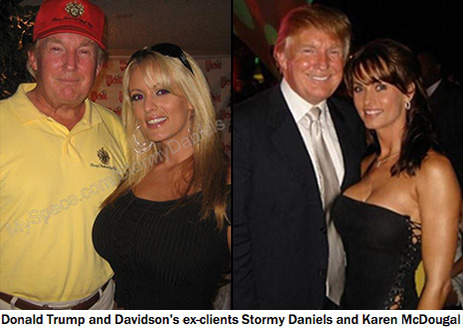
charging that LaBella knew damaging information about Trump’s activities in Russia. In an October 2017 e-mail to Arnold’s lawyer, Davidson wrote that Arnold had falsely “implicated Chuck as a witness to sordid events regarding Donald Trump.” As a result, Davidson claimed, LaBella was “undergoing severe emotional distress.”
Davidson’s professional success--and the related entanglements he has found himself in--are a product of his position as the attorney to hire if you are seeking to monetize a celebrity sex tape or compromising information about public figures like Trump, Charlie Sheen, Tiger Woods, and Kanye West. Davidson specializes in extracting payments in exchange for the quashing of incriminating videos and/or details about sexual indiscretions, STDs, and all manner of regrettable behavior.
With a client roster that has included members of a distinctly Hollywood demimonde--strippers, escorts, pimps, tweakers, and celebrity hangers-on--Davidson is a legal grinder who has represented the interests of clients who would not get past the receptionist at established Century City law firms.
On multiple occasions, Davidson signed up clients thanks to a symbiotic relationship he developed with Mike Walters, one of the most influential figures in celebrity journalism. Walters, who worked at TMZ for more than a decade before recently launching his own gossip web site, steered individuals possessing celebrity dirt to Davidson for legal representation. The TMZ pipeline proved lucrative for the attorney, but it was an ethically dubious arrangement that Walters sought to keep secret.
In one instance, after heartily recommending Davidson to a sex tape peddler, Walters explained that the referral came with a caveat: If the source told anyone about the Davidson recommendation, Walters warned, he would “deny it to the bitter end.” Asked if he paid Walters for steering clients to him, Davidson would only say, “One, I don’t want to lie to you. And two, I don’t want to ever have an adverse effect on someone else’s life.”
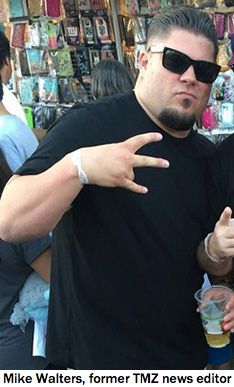
Mark Geragos, a veteran Los Angeles attorney, said that, “For the niche [Davidson] has carved out--which I guess most people would shy away from--he’s always struck me as honorable and a man of his word.” Geragos estimated that he has dealt with Davidson on more than ten occasions, and that each time, “I’m representing the target, he’s representing the person who’s seeking compensation.”
But for every opposing counsel who speaks highly of Davidson, there are lawyers like David Houston, who represents the wrestler Hulk Hogan. “He makes a living off creating misery for people, and it’s nothing to be proud of,” Houston said of Davidson. “And you certainly shouldn’t use your law degree to accomplish what amounts to, in my humble opinion, extortion.”
Owen McIntosh, who took over representation of a woman who fired Davidson, said that, “What he did in my case was inappropriate.” McIntosh, whose client claimed to have been assaulted by Lindsay Lohan, added that Davidson’s conduct was “not something that I would have done nor any attorney that I know of that understands law and obligations to a client.”
Davidson is currently a defendant in three separate lawsuits charging him with being a shakedown artist with a JD (he bristles at claims that extortion is a foundational element of his practice). His accusers are Hogan, one of the stars of ABC’s “Shark Tank,” and a waiter at a celebrity-drenched West Hollywood restaurant. Davidson has also been the target of federal and state criminal investigations stemming from the Hogan sex tape case. While those probes did not result in criminal charges, they uncovered questionable behavior on the part of Davidson, whose disciplinary record already includes a California state bar suspension for professional misconduct.
While some of Davidson’s lawyering might charitably be described as unorthodox, a lengthy investigation by The Smoking Gun has revealed that the attorney--who has practiced since 2000--has also apparently engaged in the kind of activities that result in severe disciplinary sanctions, such as directing clients to lie, splitting legal fees with non-lawyers, defying a judicial injunction, and practicing law while under suspension.
In addition to thousands of pages of court, police, and FBI records, TSG’s probe has relied on interviews with Davidson clients, opposing counsel, and business associates of the lawyer. Davidson was interviewed for more than six hours, though he declined to discuss certain topics on the record, citing attorney-client confidentiality restraints.
As he sat across from a TSG reporter in a Manhattan café, Davidson was affable, if a bit subdued during a late-February chat. He was there to make a last-ditch bid to soften a profile that he knew was the product of a reportorial excavation of his legal career.
Dressed in a suit and sipping an iced coffee, Davidson was towing luggage with him since he was next headed to the airport for a flight home. When it became clear that the reporter had not been dissuaded, Davidson made a parting request. “Don’t kill me,” he laughed. “Just break a leg.”
As it turned out, though, Davidson made one more trip across the country to sit opposite the author of this story. He had a confidential matter to discuss, he explained on the phone, and it could only be done in person.
On March 18, Davidson arrived at 9:30 AM for a meeting at the same Greenwich Village restaurant where he had previously been interviewed. Within minutes of sitting down, the grim-faced attorney said, “Bill, while you’ve been investigating me, I’ve been investigating you.”
He then reached into his bag and retrieved a file folder, from which he removed a two-page document. Davidson explained that the memo he was about to hand over was prepared by an unnamed private investigator with whom he often works.
The document--which had several redactions at the top of its opening page--made a series of stunning claims that were purportedly backed up by intelligence reports. The Smoking Gun and this reporter, the memo stated, were connected to an international narcotics distribution ring overseen by an organized crime family in Italy. Aiding in these illicit endeavors, the memo alleged, was an attorney at the New York law firm which incorporated The Smoking Gun’s parent company. The web site was some kind of an elaborate front operation, according to the document Davidson eventually returned to his manila folder.
Told by the reporter that the memo’s claims were ludicrous, Davidson seemed unconvinced. All pursed lips and plaintive stares, the attorney acted pained that he had to break it to the reporter that others knew about the journalist’s criminal secret.
When asked if this reveal was some kind of desperate, extortiony intimidation attempt on his part, Davidson assured the reporter that he had no intention of circulating the memo. He simply flew across the country to share the information gathered by his PI. After Davidson declined an offer to have his memo published alongside this story, the reporter left the café.
But Davidson’s bizarre gambit did not end that Sunday morning.
On the following Tuesday, March 20, an e-mail arrived at the Manhattan law firm that formed TSG Industries, Inc. (an online search of New York State Division of Corporation records yields the firm’s name). The e-mail--sent from a Gmail account carrying the name “Joanna Martinix”--repeated claims that the site and its editor were engaged in “business activities” with an Italian organized crime family (these revelations supposedly emerged via “due diligence”). Martinix wrote that “our client” had met with a TSG reporter “this past weekend,” but that the journalist was “unwilling to resolve this matter amicably.”
The Martinix e-mail was sent to the lawyer who Davidson’s intel memo accused of being in criminal cahoots with TSG and Italian gangsters. Martinix requested that the attorney intercede with the reporter since publication of TSG’s story seemed imminent. The e-mail appeared to be a warning that the attorney and his law firm would somehow be smeared unless they stopped publication of this article.
Shortly after the e-mail was received, a man using the name Michael Wilhelm called the law firm. Wilhelm, dialing from a Google Voice number (518-407-3011), identified himself as a “consultant” calling on behalf of a client. He also sought to engage one of the firm’s lawyers on the subject of TSG’s alleged criminal connections. Reached later on the phone, Wilhelm declined to talk about Davidson. “Listen, Bill,” he said. “It’s between you and the other guy. You’re wasting your time talking to me.”
Davidson has ceased answering questions, including ones e-mailed to him about the activities of "Martinix” and “Wilhelm.” In a March 21 statement sent through a spokesman, the lawyer declared that, “Any insinuation or accusation that I have ever breached any ethical standard is false, defamatory, and without merit.”
While the last face-to-face encounter with Davidson was intended to be off-the-record, the lawyer’s subsequent decision to use proxies to further disseminate the scurrilous claims about TSG has prompted the site to disclose what occurred during the brief March 20 meeting.
* * *
Among the rotating cast of strippers, hookers, and porn actresses that entertained Charlie Sheen at his drug-soaked Beverly Hills mansion, Kira Montgomery was one of the actor’s favorite paid acquaintances.
Montgomery grew up in Lancaster, a city on the northern edge of Los Angeles County in the Antelope Valley. Within a few years of graduating Lancaster High School, Montgomery began appearing in porn movies as the fresh-faced Taylor Tilden. By the time the feisty Montgomery was introduced to Sheen by a girlfriend who partied at the actor’s home, she was an established porn actress who had performed in scores of adult films. In short order, Sheen began paying Montgomery to have sex with him. Montgomery, who struggled with a drug addiction, also was paid for wrangling other sex partners for the “Two and a Half Men” star.

Sheen’s relationship with Montgomery sprouted during a manic period in 2011 marked by the star’s wild musings about tiger blood, winning, and his Adonis DNA. Sheen would dictate his lunatic pronouncements directly to TMZ’s Walters, who served as the actor’s stenographer. Upon hanging up the phone, Walters--known for his trademark black t-shirt and slicked back hair brimming with product--would dutifully publish the addled Sheen’s latest madness, always with an “Exclusive” banner. While Sheen was an abuser of women and his sprawling degeneracy was long established, Walters vouched for him as “a great guy!”
Montgomery’s role as a Sheen consort/wingman abruptly ended when she learned that the actor was HIV positive. Sheen blithely mentioned his status one evening, an admission that shook Montgomery since she regularly had unprotected sex with the star. Two acquaintances of Montgomery’s said that she recounted spotting antiretroviral medicines that had been prescribed to Sheen.
Montgomery subsequently confided in a friend, Jason Quinlan, about Sheen’s HIV status and her fears that she could be infected. While commiserating with the shaky Montgomery, Quinlan--who described the actress as a “fuck buddy”--considered how to quickly monetize the situation.
Quinlan, who resided in a notorious Hollywood Hills party house, once made a living selling cocaine and pot (and has a felony conviction to show for his efforts). Now 46, Quinlan is a free spirit whose YouTube page reflects his eclectic interests. Along with videos about search engine optimization and online marketing, Quinlan has posted a clip showing him snorting an unused condom through one nostril and then out his mouth and a tutorial on how to get high “to the next level” by combining marijuana concentrate with nitrous oxide. And then there are the concert videos from his former metal band, Dick Delicious and the Tasty Testicles. Quinlan has also authored a 19-chapter e-book on how to beat drug tests.
Upon learning from Montgomery that Sheen was HIV positive, Quinlan called an acquaintance, Kevin Blatt, for some guidance. Blatt, a Cleveland transplant who marketed the Paris Hilton sex tape and has sold celebrity stories to news outlets worldwide, immediately pounced, arriving at Montgomery’s residence past 4 AM. After meeting with Montgomery--who was in the midst of a meth binge--Blatt left the apartment, only to return several hours later with a proposal.
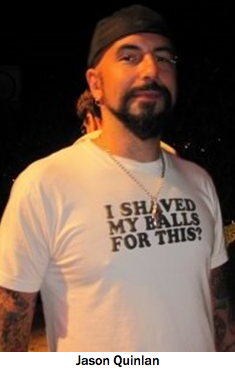
Instead of trying to sell information about Sheen to TMZ or another gossip publication, Blatt recommended consulting with an attorney who had previously represented women who pursued legal claims against the actor. With Montgomery incapacitated, Quinlan agreed to Blatt’s approach on her behalf.
Within a few hours, Keith Davidson was at the door.
Davidson, Quinlan recalled, launched into a “canned” personal injury lawyer pitch, emphasizing the importance of safeguarding Montgomery’s health and getting her checked for HIV. Montgomery, who later tested negative, signed a contingency fee agreement that called for her to receive 60 percent of any monetary settlement from Sheen. Davidson would get the remaining 40 percent. The lawyer would also be reimbursed for any expenses he incurred.
At the time Montgomery retained Davidson, she was “barely completing sentences,” Quinlan said. In an interview, Jay De Anda, who was Montgomery’s tattoo artist before the couple began dating and eventually wed in 2013, said that, “She was high as a kite on drugs and she signed all these contracts while she was fucking high.” Davidson said that Montgomery did not appear “inebriated,” adding that, “I would not have done that if I thought she was.”
According to De Anda, shortly after Davidson was retained, he asked Montgomery if she could get back into Sheen’s home and photograph the actor’s pill bottles. Montgomery declined, De Anda said, despite Davidson’s contention that, “It’ll help your case.” Asked whether he had made such a suggestion, Davidson replied, “I don’t recall saying anything like that…I mean if you’re in an auto accident, you return to the intersection and photograph it. But to reenter the house for fraudulent purposes, I don’t know if that’s kosher. I don’t recall ever discussing that, I just don’t.”
While Davidson contacted Sheen’s lawyer, he was also arranging to get Montgomery into drug rehab. Quinlan said Davidson--seeking to “protect his investment”--asked him to babysit Montgomery until she could be placed in a treatment facility. One of the claims subsequently presented to Sheen’s lawyer was that Montgomery, upon learning that her sex partner was HIV positive, became despondent and turned to illegal narcotics as a coping mechanism.
Asked whose idea rehab was, Davidson said, “I think it was an agreement between her, Jay, and probably to the extent that I even had the power to agree, me.” When Montgomery asked if rehab would interfere with her claim against Sheen, Davidson said he replied that, “it would probably help prove damages.” De Anda recalled Davidson having a more enthusiastic response to Montgomery’s recovery stint. The attorney, De Anda said, believed that Montgomery’s drug treatment would “put the case on steroids. Those were his exact words.”
Davidson subsequently found a spot for Montgomery at The Lakehouse Recovery Center in Westlake Village near the Los Angeles/Ventura county line. The rehab facility is owned by a friend of Davidson’s and is located about half-a-mile from the lawyer’s $3 million residence on Lake Sherwood (which he shares with his wife and their two young sons). Davidson paid for Montgomery’s drug rehab and also gave her cash advances after she left the treatment facility. He categorized these outlays as “case-related costs.” Quinlan said the attorney was willing to shell out tens of thousands of dollars on Montgomery’s rehab and living expenses because, “Keith was sure that he was gonna win that case.”
In fact, Davidson eventually struck a lucrative settlement with Sheen’s representatives. The actor agreed to pay Montgomery $2 million to settle her personal injury claims, which were handled privately, not through the filing of a public court complaint. The money would be paid out over a five-year period, which was intended to ensure Montgomery’s compliance with the deal’s nondisclosure provisions.
For his work negotiating the 2012 agreement, Davidson stood to earn $800,000.
The money would be a welcome windfall for the attorney, who had recently suffered several financial setbacks. According to county records, Davidson and his wife Kristi, a registered nurse, lost their Studio City home to foreclosure in 2010. The overextended couple also lost a second property in Arizona to a $1.7 million mortgage foreclosure. Their Scottsdale residence was a 5600-square-foot home with a wine cellar, wet bar, putting green, and a backyard pool and spa that overlooked the 5th fairway at the Troon North golf club. In addition to the foreclosures, the Davidsons had also faced Internal Revenue Service and California state liens over unpaid tax bills. [In July 2017, the California Franchise Tax board filed a new lien against Davidson for $30,000 in unpaid taxes related to his 2014 and 2015 returns.]
Blatt and Quinlan--who delivered Montgomery to Davidson--also shared in the Sheen settlement’s proceeds. The payments to the duo came out of Davidson’s end and were distributed by the lawyer upon his receipt of the Sheen installment payments.
Blatt, 49, is a nonpareil Hollywood hustler, a porn industry veteran and natural gossip who is deeply attuned to the editorial needs of checkbook journalism outfits like TMZ and the National Enquirer. By Davidson’s estimate, Blatt referred him upwards of 15 cases during the five-plus years they worked together as a formidable tag team. Blatt says he stopped bird-dogging clients for Davidson a couple of years ago due to concerns that the lawyer “flies too close to the fucking sun.” Detractors, of course, have accused Blatt himself of sometimes taking a similar Icarus-like path.
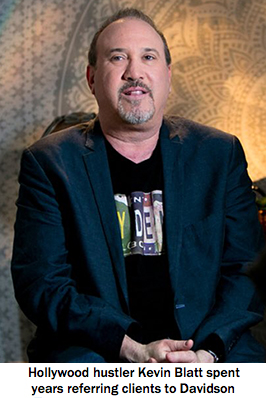
When asked about his payments to Blatt and Quinlan--neither of whom is an attorney--Davidson denied that they amounted to the splitting of legal fees with non-lawyers. The State Bar of California prohibits an attorney from “directly or indirectly” sharing legal fees with anyone who is not a lawyer. Davidson characterized the remittances as gratuities, discretionary payments on his part that were not the subject of any prior agreements. These outlays, he added, were “pursuant to California law.”
This was an explanation that Davidson repeated when he was questioned about other individuals who financially benefited from steering clients to him.
In the McDougal case, a web of overlapping relationships resulted in the Playboy model retaining Davidson, whose contingency fee was 45 percent of the eventual $150,000 payout.
Part of that fee was shared with John Crawford, an ex-cop who now owns and operates five UPS stores in the Phoenix area. Jay Grdina, a former adult film actor and ex-husband of porn superstar Jenna Jameson, also got a cut. Crawford, a McDougal friend, helped connect her with Davidson through Grdina, an Arizona acquaintance. Grdina, whose brother James was once married to McDougal, had previously retained Davidson to handle legal matters related to his business start-ups. Securities and Exchange Commission filings made by Grdina identify Davidson as general counsel and director of one such company (Davidson told TSG that he was never an officer of the firm and that his name was used without permission). James Grdina’s holdings include The Dirty, a gossip blog run by Nik Richie. Davidson said that Richie has steered two clients to him, but received no gratuities in return for the referrals. Richie, Davidson said, just “thought that I was a good lawyer.”
Keith Davidson
TAGS
Keith Davidson, sex tape, Donald Trump, TMZ, Karen McDougal, Hollywood, Stormy Daniels, Charlie Sheen, Hulk Hogan, porn, Mike Walters
Page 2 of 4
Another former porn performer, Gina Rodriguez, has been a leading source of celebrity case referrals to Davidson for more than a decade. Rodriguez now manages a slew of D-list celebrities and is an executive producer of a WE tv reality show chronicling the weight loss journey of June Shannon, the matriarch of the Georgia family featured on the TLC program “Here Comes Honey Boo Boo.” Rodriguez has specialized in wrangling mistresses (see: Woods, Tiger), porn actresses, and prostitutes with stories to sell. Davidson estimated that Rodriguez, like Blatt, has referred him a maximum of 15 clients, including Stormy Daniels.
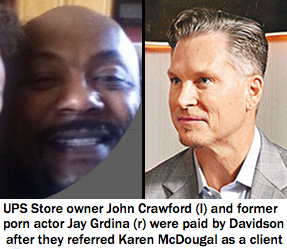
Montgomery was out of the porn business by the time the first checks from Sheen began arriving. She married De Anda in a Las Vegas ceremony in September 2013 and was living in a rented house in a gated development in Calabasas.
It was not long after the duo’s nuptials when they fired Davidson and replaced him with another L.A. personal injury attorney. The switch, however, would not impact Davidson’s continued collection of his share of the Sheen settlement.
Until it did.
Montgomery’s new lawyer, Sean Bral, conducted a review of the Sheen settlement documents and an audit of payments made by the actor (the Sheen funds went to Davidson’s client trust account, from which money was then distributed to Montgomery, Blatt, and Quinlan). Bral reported back to his clients that Davidson had mishandled proceeds from the Sheen settlement.
Bral then contacted Davidson and accused him of malpractice. Bral charged that Davidson had split his fee with non-lawyers, billed Montgomery more than the actual cost of her rehab stay, and received more money than he was entitled to in the Sheen agreement. Davidson denied sharing his fee with Blatt and Quinlan. He told Bral that the rehab facility charged him more than the published rate because he paid Montgomery’s bill on an installment plan. But as for the claim that he received too much of his settlement share up front, Davidson had a problem.
Bral noticed a discrepancy in the Sheen agreement and a related financial distribution sheet that Davidson had modified. Bral had an ethics opinion that contended Davidson should have afforded Montgomery the opportunity to consult independent counsel before agreeing to the modification (since it could amount to a conflict due to Davidson’s and Montgomery’s shared financial interests).
Though Davidson denied Bral’s malpractice claims, he agreed to disgorge funds he had received as part of the Sheen settlement. His capitulation to Montgomery’s legal demands also included the forgoing of all future payments. Like the celebrity settlements struck by Davidson himself, this one was done confidentially. Which surely did little to soften the blow the attorney suffered.
De Anda offered a blunt take on the predicament Davidson faced: “We had to threaten him to pay it all back or we were going to the Bar and get his license taken away.” Davidson’s decision to cede his share of the Sheen money was likely influenced by the fact that his law license had been suspended four years earlier and he wanted nothing to do with another State Bar investigation.
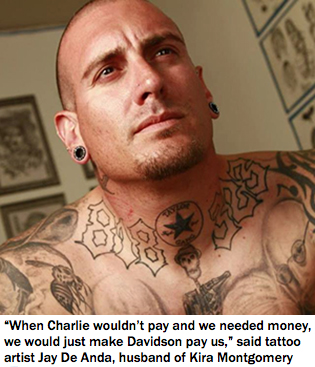
The tables had been turned on Davidson, who now was the one getting squeezed.
In fact, De Anda and Montgomery viewed their former attorney as something of an ATM. De Anda said, “When Charlie wouldn’t pay and we needed money we would just make Davidson pay us.” The lawyer not only shelled out money to Montgomery, but he ended up footing the bill for other expenses related to the Sheen case.
In mid-2014, Montgomery’s representatives became concerned about a series of posts on the Diary of a Hollywood Street King blog that reported she had received millions from the HIV-positive Sheen to “keep his medical business on the hush.” The suspected source was a DJ who procured sex partners for Sheen and became friends with Montgomery.
Though Davidson no longer had a financial stake in the Sheen settlement, he was directed by Montgomery & Co. to handle--and pay for--a remediation effort. The fear was that the blog items could be cited by Sheen’s lawyers as justification to cease payments based on a claim that the agreement’s confidentiality provisions were breached.
As detailed in a series of e-mails between Davidson and the blog's attorney, Davidson originally offered $24,000 for “a complete blackout on objectionable subject matter.” After negotiating for a month, Davidson agreed to pay $60,000 for the deletion of about 10 stories mentioning Sheen’s HIV status, his relationship with Montgomery, and his drug use. The offending stories included a dispatch headlined “Hollywood Whore Wrangler & HIV+ Tranny Could Be Charlie Sheen’s Worst Nightmare!”
The Sheen settlement was now costing Davidson money.
While payments to Davidson, Blatt, and Quinlan ended upon the lawyer’s firing, Montgomery continued receiving money from Sheen up until the star revealed that he was HIV positive during a November 2015 appearance on The Today Show. The actor claimed that he had been the victim of “shakedowns” by individuals threatening to disclose his HIV status. Asked if he would continue to make such hush money payments, Sheen replied, “Not after today, I’m not.”
The actor cast his admission as an effort to dispel the stigma associated with HIV. “I have a responsibility now to better myself and to help a lot of other people,” Sheen said. Privately, however, the performer raged, blaming Montgomery for leaking word of his HIV status. In a text to a mutual friend, Sheen wrote, “I fucking despise Kira and what she’s done to me and my family.” Her actions, Sheen added, were “beyond treason.”
As a result of Sheen’s subsequent claim that Montgomery, 30, violated terms of the settlement, the parties entered into a confidential arbitration proceeding. Montgomery, now the mother of two young children, has forwarded her hefty bills for that arbitration to Davidson for payment.
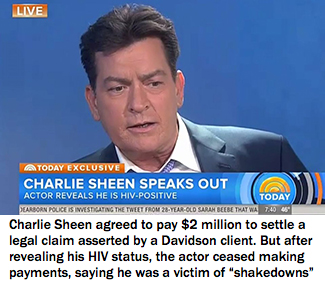
Quinlan, who estimated that he got around $30,000 from the Sheen settlement, said that he had little recourse when Davidson ceased paying him. “It was kind of a shady deal,” Quinlan said, adding that his arrangement with the attorney was not “a normal above-the-board business thing where you can take it to court.” Still, Quinlan did not blame Davidson. “I honestly think he woulda kept paying it,” Quinlan said, but “his money stopped coming in.”
Quinlan then opined on the disparity between Davidson--an avid golfer who is a member of the exclusive Sherwood Country Club--and the louche characters he often represents in celebrity cases: “The funny thing is that his personality is the exact opposite. He’s a total fucking square. He’s married with kids and goes to a country club. He’s like the exact opposite of what his whoring skills are.”
Quinlan continued, “Keith’s actually pretty cool. He’s actually a pretty decent dude. He’s a shady lawyer but he’s a decent guy.”
To be clear: This was a compliment on Quinlan’s part. A Hollywood kind of compliment.
* * *
Davidson is a native of Brockton, Massachusetts, where his large Irish-American family includes several generations of firefighters. About an hour south of Boston, Brockton is known as the “City of Champions” since it was the home of boxing legends like Rocky Marciano, the undefeated heavyweight champion, and “Marvelous” Marvin Hagler, who held the middleweight title for seven years during the 1980s. Davidson recalled in an interview how he and his friends--in a Rocky-esque moment--would chase after Hagler as the boxer did roadwork on the Brockton streets.
After graduating Brockton High School in 1989, Davidson attended Boston College, where he studied economics. Though he could not afford BC housing, Davidson still lived on campus, thanks to a high school buddy who welcomed him as an unofficial roommate in a six-man dormitory suite. Davidson’s nest was an 8 x 10 space that had been used as a closet. Davidson graduated BC in 1994 and worked for the Massachusetts state legislature and the Plymouth County District Attorney’s Office before his acceptance to Whittier Law School in Costa Mesa, California. Whittier, a bottom-tier school, last year announced that it would be closing in the face of financial problems and a disastrous bar passage rate (22 percent).
In December 2000, Davidson was licensed to practice after passing the notoriously difficult California bar exam (from that point forward, he has worked as a solo practitioner). As a young attorney, Davidson represented all types of criminal defendants, from drunk drivers to accused killers. He sounded wistful while recounting how he secured an acquittal for a young woman charged with murder. The defendant’s impoverished mother, Davidson said, struggled to pay him and sometimes did so with rolls of quarters. While describing his early days as a defense lawyer, Davidson recalled receiving a note from an aunt, who is a nun. She wrote to remind her nephew to always remember the plight of the poor.
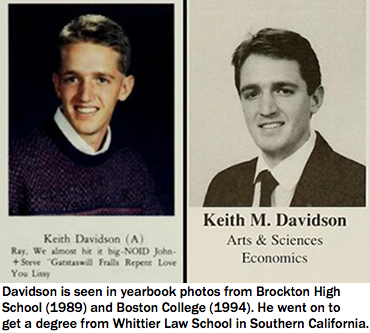
In addition to his law practice, Davidson was involved in the management of professional boxers. Through a mutual friend, he met trainer Freddie Roach after moving to Los Angeles. Roach, who grew up about 15 miles from Davidson’s hometown, was instrumental in helping the attorney become part of the management team for fighters like Manny Pacquiao and James Toney.
Though he no longer manages boxers, Davidson remains close to Roach and, according to a source, once even quashed a sex tape for the trainer. Asked about this, Davidson took a long pause and answered, “Freddie’s a single guy, he’s charming as hell,” adding that the wealthy Roach was a “target.” Roach and Davidson are codefendants in a lawsuit filed by Gabriel Rueda, a Los Angeles waiter who contends that he is entitled to a multimillion dollar finder’s fee for his role in arranging Pacquiao’s 2015 fight against Floyd Mayweather. Rueda, who also goes by Gabriel Salvador, accuses Davidson of trying to extort him in a bid to force the acceptance of a lowball settlement offer. Davidson denies Rueda’s charges.
Davidson’s practice would eventually transition into the handling of civil matters, primarily personal injury cases taken on a contingency fee basis. The nature of Davidson’s civil caseload is reflected in the source code of his web site, which includes tags like “herpes,” and “dental malpractice.” He has also registered web domains like birthinjurysupport.com, burnresources.com, drowningsupport.com, mvcrash.com, and teslaclassaction.com. Additionally, Davidson registered charliesheenlawsuit.com the day before the actor disclosed his HIV status. A cached version of Davidson’s web site from 2006 shows that the lawyer claimed his firm was “staffed with only the best and brightest talent in the legal field” and that “each of our employees possess the perfect mixture of mental and physical toughness.” Davidson--who only employed a paralegal, Vilma Duarte--also declared that, “We maintain not only trained legal minds, but a staff of medical doctors, registered nurses, and psychiatrists as well.”
Despite overheated claims of unparalleled proficiency and exacting legal standards, Davidson was the subject of three separate complaints lodged with the State Bar of California. He was accused of assorted professional misconduct, including mishandling a lawsuit filed on behalf of an L.A. couple who sued a state hospital for the mentally ill over complications their son suffered from a brain injury. Davidson failed to show for court hearings in that medical malpractice case, prompting a judge to dismiss the matter (news that the lawyer did not share until confronted by his clients weeks later).
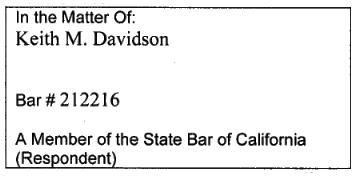
Davidson would also face a lawsuit filed by an ex-client who accused him of professional negligence and alleged that he included “materially false allegations” in a lawsuit he filed on her behalf against the Los Angeles County Sheriff’s Department. The woman, who had signed a contingency fee retainer with Davidson, alleged that when the attorney determined that her “medical damages were not as once originally believed,” he “decided not to put any time or money into the case,” thereby placing his financial interests above hers. Davidson eventually paid the client, an elderly Korean-American woman, to settle the lawsuit, which was not part of the state disciplinary action.
Charged with repeatedly failing to “perform legal services with competence” and willfully violating professional conduct rules, Davidson “recognized his wrongdoing and admitted culpability,” according to a 2010 State Bar filing.
Months before the tenth anniversary of his bar admittance, Davidson was hit with a two-year suspension, placed on probation for three years, and ordered to attend State Bar Ethics School. As part of his probation, Davidson was required to submit sworn quarterly reports confirming his compliance with the State Bar Act and professional conduct rules. Since Davidson had not been previously disciplined--and he provided character letters attesting to his “overall honesty”--the two-year suspension was stayed in favor of a 90-day period in which he was barred from practicing law.
As it turned out, Davidson actually got lucky. Disciplinary officials were unaware of another matter from the same period that, if discovered, might have cost him his license.
* * *
Davidson’s first celebrity case involved someone trying to get rich off the back of Paris Hilton. That someone was Davidson himself.
In November 2005, a large cache of Hilton’s belongings were purchased at auction for $2775 at a Public Storage location in Culver City. The heiress’s representatives had failed to pay an outstanding $208 bill, so the contents of her locker--personal diaries, racy videos, nude photos, medical and financial records, clothing--were sold off “Storage Wars”-style.
Nabila Haniss, the woman who purchased the Hilton material, later stated in a sworn court affidavit that she sold the items for $150,000. Haniss’s lawyer told ABC News that his client did not know the identity of the purchaser, who “came with a bag of cash and she handed him” Hilton’s property.
In January 2007, the web site Paris Exposed (parisexposed.com) launched, offering a massive trove of Hilton’s belongings. “Never Before in the History of the World has a Celebrity Been Exposed Like This! This is the Stuff the Public Was Never Meant to See,” the site screamed. For $39.97, visitors could browse through 25,000 personal photos and read Hilton’s journals with “her private thoughts about sex, dating, drugs and boyfriends.” The slick, professionally produced site offered Hilton’s medical records and promised to answer such questions as “Did she really give Cher’s son genital herpes?”
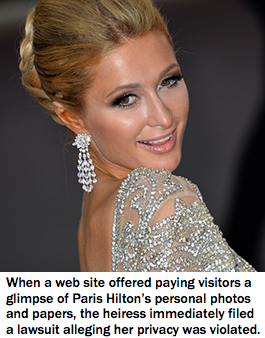
Within days of Paris Exposed appearing online, Hilton’s lawyers filed a federal lawsuit accusing the site of copyright infringement and invasion of privacy. A Hilton attorney declared that it was "one of the single most egregious and reprehensible invasions of privacy ever committed against an individual."
A United States District Court judge agreed and issued a February 20 injunction barring Paris Exposed from continuing to publish a wide range of the Hilton material. The only defendant cited in Judge George King’s order was Bardia Persa, who was named in the site’s domain registration. Hilton’s counsel believed that Persa, whose address was a post office box in Panama City, Panama, was a fictitious individual. Armed with the injunction, Hilton’s lawyers succeeded in getting Paris Exposed removed from its servers, which were located at a hosting firm 30 miles outside of Amsterdam in the Netherlands.
For four months, the Hilton material remained offline. Then, in early-June, Paris Exposed reappeared, offering a $19.97 “relaunch special” subscription. Flouting the standing court injunction, the site’s front page brayed, “The City that let OJ Simpson go free quickly reacted to Ms. Hilton’s request and forced ParisExposed.com offline for Privacy and Copyright Issues.” Taunting the court and Hilton’s counsel, the site reported that it was now hosted “on hundreds of servers placed around the world behind secure firewalls in jurisdictions that will not bow to the heiress and her overpaid legal team.” According to sources and server records obtained by TSG, the site’s relaunch was shepherded by a programmer whose prior experience included work for the sites pornojunkies.com and transexualworld.com.
The Paris Exposed relaunch was remarkably brazen and prompted a Hilton lawyer to remark in a court filing that, “even an injunction issued by a United States District Court is insufficient to deter” the site’s operators.
Hilton’s attorneys returned to court and sued several new defendants, including Green Brothers Limited, an offshore entity that was the web site’s new registrant. The shell company, formed on the Caribbean island of St. Kitts, was represented by Davidson.
Asked about his role with Paris Exposed, Davidson told TSG, “I represented someone who was the content owner at one point.” Asked who that was, he replied, “I can’t really say.”
While Davidson sought to minimize his role with the outlaw web site, two sources with detailed knowledge of the creation of Paris Exposed described the attorney as the driving force behind the business. “All of the coordination efforts were managed by Mr. Davidson,” said a former Paris Exposed staffer. “I never met anyone else who was coordinating things.”
According to the sources, Davidson, who has no technical expertise, recruited an acquaintance, digital entrepreneur Andrew Maltin, to hire the team of programmers and designers who spent months digitizing the Hilton material and building the web site. The group worked from a rented L.A. home, where some coders bunked in the run-up to the site’s launch. Two months before Paris Exposed debuted, a Davidson deputy flew to Amsterdam to set up the site’s servers in the city of Haarlem.
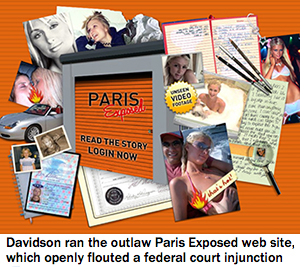
One source recalled that Davidson traveled to St. Kitts to establish banking and credit card processing accounts. The second source said that Davidson had a controlling interest in the business, while Maltin had a smaller equity share. Both sources believe that Davidson was responsible for securing the capital used to purchase the Hilton trove, but they were unclear whether he found an investor or put up the money himself.
When Davidson was confronted with the source accounts of his managerial role with Paris Exposed, his halting answers were punctuated by long pauses. Asked if he traveled to St. Kitts to form the shell company and establish business accounts, Davidson answered, “I don’t know, let me get back to you on that one.” As for whether he owned a piece of the web site, Davidson said, “I don’t believe so, no.” Did he recruit Maltin and oversee the web site’s development? Davidson replied that he would also need additional time to answer that question.
More importantly, as to the matter of an attorney flouting a federal court order, Davidson went mute. Asked if his silence equated to a “Still want to think about it,” Davidson said, “Yes.” The lawyer subsequently declined to further address any TSG questions about his role with Paris Exposed.
The web site has been offline for years and the parisexposed.com domain is parked at an L.A. web hosting firm. The site’s administrative contact, who appears to be fictitious, is listed at a nonexistent address in Toronto, Canada.
* * *
Davidson was first accused of being a shakedown artist in October 2010. And then again 46 days later.
In an invasion of privacy lawsuit brought by Tila Tequila, the model/reality TV star alleged that Davidson, who represented a former boyfriend of Tequila’s, threatened to market a sex tape the couple filmed years earlier. Tequila charged that Davidson warned that he would sell the video “overseas” if she did not consent to its distribution.
A rogue foreign sale of the sex tape would result in no profits for Tequila. But if she agreed to the video’s distribution (like Paris Hilton and Kim Kardashian had done before), Tequila would get a cut of the proceeds. Tequila, however, had no interest in the home video’s distribution. She had filmed a pair of yet-to-be-released pornos for Vivid Entertainment and did not want a competing title on the market.
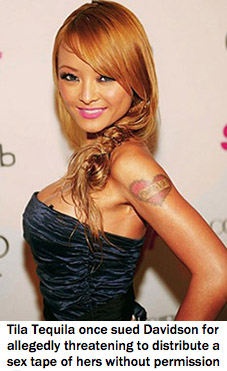
“I’m not a high pressure guy like, ‘Buy this or else. Or if you don’t buy this, we’re gonna take it offshore,’” Davidson said in an interview. “This is not something I do.”
As with many of Davidson’s celebrity cases, Blatt was responsible for putting the attorney together with Tequila’s former beau, musician Francis Falls (Davidson, Blatt, and Falls were codefendants in the Tequila lawsuit). Blatt had tried to sell the tape to Vivid, but acknowledged that he had not secured Tequila’s consent for its distribution. According to Steve Hirsch, Vivid’s CEO, Blatt added that there were “ways to get around” Tequila’s intransigence, including uploading the footage to servers in Canada or China.
Tequila’s allegations against Davidson came at a sensitive time for the attorney, who was in the middle of his 90-day suspension for professional misconduct. So Davidson moved quickly to extricate himself from the lawsuit.
In an e-mail sent to Tequila’s attorney two weeks after the complaint was filed, Davidson wrote that he had personally acquired the copyright to the Tequila sex tape and was ready to turn it over to the model in exchange for dismissal of the lawsuit. But he required something else: Language in the settlement agreement needed to state that no attorney involved in the matter “has breached any ethical duty...including without limitation any application of the California Rules of Professional Conduct.”
Asked how he obtained the copyright from his client, Davidson replied, “I don’t recall. I don’t recall if I paid him a dollar or $500. I have no idea.” He added, “So I acquired the copyright and was willing to give it back to her for nothing. I thought that it was probably an admirable thing to do and a way to get rid of the whole case.”
Tweet
Keith Davidson
TAGS
Keith Davidson, sex tape, Donald Trump, TMZ, Karen McDougal, Hollywood, Stormy Daniels, Charlie Sheen, Hulk Hogan, porn, Mike Walters
Page 3 of 4
Davidson did not answer subsequent questions about the propriety of such a transaction with a client, especially since it afforded him direct benefits like dismissal of the lawsuit and settlement language stating he had not violated professional conduct rules. Davidson also did not reply when asked if Falls was represented by separate counsel in the copyright transaction.
Falls told TSG that he did not receive any money in return for handing over the sex tape and its copyright. Falls was not one of the individuals copied on the settlement proposal Davidson sent to Tequila’s lawyer. Davidson noted in the e-mail that he was on a 90-day suspension and was only representing himself.
In that e-mail, which was also sent to Vivid executive Bill Asher and the company’s attorney, Davidson appeared to try and curry favor with the porn film distributor (which was working in tandem with Tequila’s lawyer). “I have no axe to grind with Vivid,” Davidson wrote. “In fact, I like to think that I have always been a fan, if not a friend of Vivid’s.” The personal injury lawyer then took credit for his prior “dissuading” of legal claims that at least two porn actresses sought to pursue against Vivid. One woman alleged that she had been abused by Asher, while another actress had complained about unsanitary conditions on Vivid video shoots.
Six weeks after Tequila sued Davidson, Charlie Sheen filed a lawsuit accusing the attorney of conspiring with a client--porn actress Capri Anderson--to fabricate details of a purported assault in a bid to “shake down Sheen for at least a million dollars.” The complaint, filed by Hollywood litigator Martin Singer, noted that Sheen “refused to give in to the extortionate demand.” A day after the alleged assault at the Plaza Hotel in New York, Singer wrote, Anderson “promptly retained an attorney in Los Angeles...and decided this was her opportunity to cash in.” While referred to in the lawsuit, Davidson was not identified by name.

Blatt, who first ccontacted Anderson, quickly put the actress together with Davidson. After a meeting at the Mondrian in West Hollywood, Anderson agreed to representation by the attorney.
Anderson’s allegations against Sheen would be the subject of a series of TMZ exclusives, one of which reported--three days after the Plaza incident--that Anderson “had lawyered up, hiring a high-profile Beverly Hills attorney.” Another story reported that Anderson’s attorney had e-mailed Sheen’s lawyer to report that the porn actress had retained counsel.
Thanks to his debauched ways, Sheen became an annuity of sorts for Davidson, who represented a series of clients who pursued successful legal claims against the performer (whose middle daughter once attended the same private school as Davidson’s sons). Since the Anderson matter appeared to be a winner, Davidson was willing to foot certain expenses, like a hotel room and spending money for the 22-year-old accuser. Asked, in general, about such outlays, Davidson said, “If you have a case that you think has substantial value, then you’re probably more apt to pay for expenses or provide advances on the settlement to the client.”
While Davidson’s work on Anderson’s behalf was typical of his celebrity cases, there was one important difference: His law license was suspended when he took on the case and he remained barred from practicing for a month afterwards. When Davidson initially contacted Singer, Sheen’s counsel, to discuss an “urgent” matter, he was under suspension. When Davidson subsequently spoke with Singer over the phone and made a $1 million demand on Anderson’s behalf, he was under suspension. When Davidson arranged with Good Morning America to appear with Anderson on the ABC morning show, he was under suspension.
Questioned about practicing while his license was suspended, Davidson said that he was extremely careful during the 90 days he was supposed to be sidelined. Asked if he had slipped up, the lawyer replied, “No, I didn’t.” Davidson pledged to research the timing of his contacts with Singer, but he failed to respond to subsequent TSG questions about those communications.
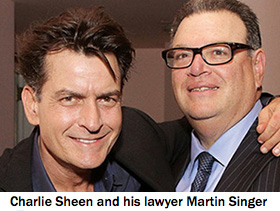
During one interview, Davidson told TSG that only a small percentage of his caseload--no more than 15 percent--involved celebrity matters. The balance of his practice, he added, was mundane personal injury claims. It is hard to tell whether Davidson’s estimate is accurate, but a desire to lowball the number of sex tape, celebrity STD, and Charlie Sheen cases is understandable. In light of Davidson’s Trump settlements, his practice has been reduced--at least in some social media circles--to a caricature: He’s the sleazy Hollywood attorney who crafts hush money agreements when he is not busy engaging in what one CNN commentator termed “legal extortion.” Davidson said that he was an “easy target” and expressed frustration at how, during one civil case in which he was not a party, a plaintiff’s counsel stopped referring to him by his name and instead just called him “the extortionist.”
It is difficult to quantify the number of sex tape matters that Davidson has handled. But for about a decade, the lawyer has been immersed in celebrity skin, from actress Minka Kelly to Verne “Mini-Me” Troyer. In 2012, two separate Kanye West sex tapes were “being shopped to media outlets,” TMZ’s Walters reported. Both tapes--one of which a Davidson client possessed--were bought back by the rapper, who blamed a traitorous relative. In the 2016 song “Real Friends,” a bitter West rapped, “I had a cousin that stole my laptop that I was fuckin’ bitches on / Paid that nigga 250 thousand just to get it from him.”
When conducting a sex tape negotiation, Davidson, though across the table, seeks to portray himself as someone there to help the celebrity. “I’m not a bad guy. When I get a case, if I have something I’ll let you know I have it,” he said. “I’ll say, ‘Hey, there’s this thing floating around, would you like me to get involved? Would you like me to help you take it off the market?’” Davidson is quick to add, “Look, it’s not all altruistic...I make money, too.”
Davidson--who could probably lecture on extortion statutes--is a careful negotiator not prone to threats. Still, while he earnestly offers to help you take compromising material “off the market,” celebrities must sense that an “or else” hangs in the air, unspoken. If West did not spend a fortune to recover his laptop, was it going to just collect dust in his cousin’s closet? If Kelly showed no interest in the tape shot when she was a teenager, would the ex-boyfriend of the “Friday Night Lights” star lose interest in an easy payday?
While at TMZ, Walters manned the sex tape desk. An exclusive about a video’s existence would be followed by a story describing the erotic action which would then yield to a piece about a purported bidding war that had erupted for the video. Aided by Davidson and Blatt, Walters crafted story arcs that became as predictable as Harvey Levin’s snug muscle shirts. The site’s sex tape coverage effectively amounted to a friendly reminder to celebrities that it would be a shrewd decision to write a check to corral any wayward videotapes.
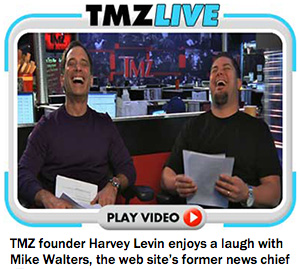
For years, Walters was Davidson’s most important entertainment industry contact. As head of TMZ’s news operation, the 37-year-old Walters had access to the gossip industry’s single most valuable commodity: the web site’s e-mail and phone tip lines, which are flooded daily with scores of dropped dimes and offers. It is hard to overstate the value of the TMZ tip lines, which are often the first point of contact for those seeking to cash in on celebrity dirt in all its forms.
Walters referred Davidson to sources and subjects of TMZ stories, vouching for the lawyer’s bona fides. For instance, when a former Playboy Playmate accused Hugh Hefner’s oldest son of assaulting her, Walters referred the woman to Davidson for legal representation. After a series of exclusives about the alleged assault, TMZ capped its coverage with a story that noted the Playmate had “lawyered up with powerhouse attorney Keith Davidson.”
Walters was also responsible for steering a Betty Ford Center employee named Dawn Holland to Davidson. Holland claimed to have been battered one evening by a drunken Lindsay Lohan, who was being treated at the Rancho Mirage clinic. Holland, a technician, was subsequently fired from her job for violating patient confidentiality by speaking with TMZ about the Lohan incident and providing the web site with a confidential medical record.
Holland, herself a recovering addict, had spoken to local police about the confrontation with Lohan, but ceased cooperating with the authorities after she hired Davidson the day after her termination. TMZ paid Holland at least $10,000, with the funds being sent to Davidson’s client trust account.
Before eventually being fired by Holland, Davidson worked with Lohan’s father Michael to try and set up a deal to sell photos of Holland and Lohan meeting to bury the hatchet. Owen McIntosh, who replaced Davidson, said that his predecessor’s actions “were not appropriate,” especially with regard to his dealings with Michael Lohan. Davidson’s actions, he added, were “not something that I would have done nor any attorney that I know of that understands law and obligations to a client.”
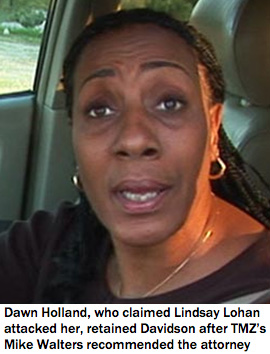
While Walters was sending business to Davidson--including a nearly disastrous referral in the Hulk Hogan sex tape case--the lawyer was providing legal services to the TMZ employee and at least one of his family members, records show. Davidson is listed as Walters’s “retained attorney” in connection with a 2014 traffic court case in Orange County, where Walters resides. Davidson also incorporated a company for Walters. Formed in July 2010, KMW Holdings, Inc. listed its address as Davidson’s Beverly Hills office.
Walters’s connection to the company was first revealed in a February 2013 disclosure filing with California’s Secretary of State. That document identifies Walters as the firm’s CEO and sole officer. KMW Holdings, which still listed its address as Davidson’s office, described the nature of its business as “marketing consultation.” Corporate filings offer no further insight into the nature of the consulting services performed by Walters. In addition to doing legal work for Walters, Davidson said that he also handled a “minor matter” for Walters’s father (and may have handled a court case for a third family member).
In reply to questions about whether he was paid for his Walters family work, Davidson said he was unsure. “I think I billed his father for costs, I think,” Davidson said. As for Mike Walters, the lawyer first said that he thought he had been paid, but then added, “I’m not sure...I might have just done it because we were friends.”
Davidson was similarly noncommittal on the subject of “tipping” Walters for client referrals. “Not that I recall” was followed by Davidson saying, “Let me think about that and get back to you.” He concluded, “One, I don’t want to lie to you. And two, I don’t want to ever have an adverse effect on someone else’s life.”
When TSG first sought to question Walters--who was then still at TMZ--about the ethical implications of his dealings with Davidson, he did not reply to questions that he asked to be e-mailed to him. When later reached on his cell phone, Walters pretended to be someone else.
Last month, Walters again asked for questions to be e-mailed so that, “I can give it to my people.” Before hanging up, Walters was asked if he had ever been compensated by Davidson for steering clients to him. “Bill, it’s ridiculous,” he said. “Just e-mail if you want, dude.” In a subsequent statement, Walters’s lawyer said, “Although the absurdity of your questions warrant no response whatsoever, it is unfortunate that my client cannot respond.” Walters last year founded The Blast, a TMZ wannabe funded by Banijay Group, a multinational media firm.
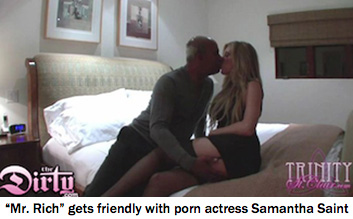
Walters and TMZ have not covered all of Davidson’s sex scandal cases, especially if they were only celebrity-adjacent matters that involved names unrecognizable to gossip fans accustomed to stories about the Kardashians, Real Housewives, and the latest rap world beef.
In June 2013, two blogs--Nik Richie’s The Dirty and Porn News Today--published photos showing a wealthy business executive seated on a bed kissing and groping porn actress Samantha Saint. The man was Richard Nanula, a principal of Colony Capital, the private equity firm now headed by Thomas Barrack, who chaired the Trump inaugural committee. Nanula, now 57, was also chairman of Miramax, the film company Colony bought for $660 million from Disney (which had purchased the firm from Harvey Weinstein and his brother Bob).
Nanula regularly employed prostitutes and, on occasion, would also pay porn stars for sex (known in the adult industry as doing a “private”). Though Nanula was wildly wealthy, he remained a man of simple pleasures: Adult actress Sarah Shevon recalled passing up $1500 to perform a “sloppy blowjob” on the businessman. The offer was relayed by Trinity St. Clair, a fellow actress who did not identify the oral sex-seeker.
Since some of the actresses Nanula wanted to have sex with did not do “privates,” the executive got creative. St. Clair booked several women to shoot sex scenes with an actor who used the stage name “Mr. Rich.” The resulting videos were purportedly destined for St. Clair’s web site, which today offers visitors a “custom jerk off video” for $250 and a pair of St. Clair’s used panties for $100. One of the adult performers duped by Nanula was Shevon, who said she was paid $300 cash for shooting a “BJ scene” with "Mr. Rich" at his Malibu estate.
Instead of appearing like the creepy old john that he was, Nanula had transformed himself into an actor-producer, just another lecherous Hollywood hyphenate.
After the photos of Nanula leaked, friends of the businessman scrambled to contain the damage. It was not long before they sought Davidson’s assistance.
The attorney--who never formally represented Nanula--quickly got The Dirty to delete its post. Davidson then sent an e-mail to Porn News Today asking the site’s editor, Alexandra Mayers, to contact him “regarding an urgent matter.” During a subsequent phone conversation, Mayers recalled, Davidson tried to determine whether she would accept a “payoff” to delete the Nanula item. Mayers said she told the lawyer that the post would not be removed, “especially now that I know someone out there wants me to take it down.”
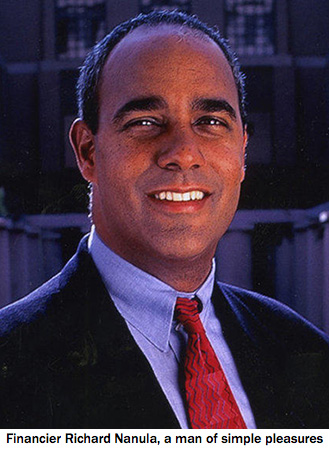
Part two of the cleanup effort required locating the women Nanula had fraudulently induced into committing acts of prostitution. Then came the financial settlements and the accompanying nondisclosure agreements.
While Davidson was eventually big-footed by a large L.A. law firm representing the financier, he remained in the Nanula matter, representing porn actresses who filmed sex scenes with “Mr. Rich.” One source told TSG that Davidson was aided in signing up the women as clients by Gina Rodriguez, one of his longtime referrers of business.
Though Davidson worked both sides of the Nanula matter, that was of little concern to the executive’s advisers. Everyone’s interests were aligned. No disqualifying conflicts existed. So why let Davidson’s particular set of skills go to waste?
* * *
Like Nanula, trouble arrived for Hulk Hogan via a blog post.
In early-March 2012, TMZ reported that a sex tape featuring the wrestler was being shopped to a “major porn studio.” The item, courtesy of Walters, noted that the site had been provided “grainy footage” showing Hogan consorting with an unknown woman. Also that “Hulk’s thong-shaped tan line” was visible. Later that day, Hogan (real name: Terry Bollea) appeared on a TMZ webcast to say that he was secretly filmed without permission.
Five weeks later, a still from the Hogan sex tape appeared on The Dirty. A second photo was published by the blog two weeks later along with an ominous hint that the video contained material more embarrassing than Hogan’s tan line: “Terry, do you remember what you said about black people in this sex tape?” Upon seeing the stills, Hogan knew that the woman pictured was the wife of his best friend, Todd Clem, and that the video had been shot in the Clems's Tierra Verde, Florida home.
Known as “Bubba the Love Sponge,” Clem was an abrasive shock jock with a history of Federal Communications Commission fines. Clem dominated the Tampa radio scene, where theatrical stunts, feuds, and shifting allegiances would be familiar to any wrestling fan. His crew included sidekicks known on-air as “Cowhead,” “Big Dick,” “Jabberjaw,” and “25 Cent.” At any one time, it seemed that a "Bubba" employee was plotting to either defect or dethrone the boss.
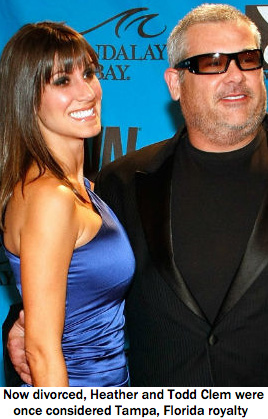
Within days of the initial TMZ story about the Hogan sex tape--which did not identify the wrestler’s sex partner--a one-page Word document (Hulk_Hogan_Sex_Tapes.doc) circulated among Clem’s underlings. It provided a graphic description of two separate sex tapes reportedly featuring Hogan and Heather Clem. On one tape, Hogan made racist comments and used the N-word, according to the synopsis.
The source of the Hogan leaks to TMZ and The Dirty was Matthew “Spice Boy” Loyd, an ex-intern who became a Clem co-host and grew to dislike the shock jock. Loyd says that he found the Hogan sex tapes inside a movie box set that he purchased at an annual “garage sale” fundraiser organized by Clem (Loyd supposedly was expecting to find “Rocky” movies inside the box). Law enforcement officials who later investigated how Loyd got the DVDs concluded that he swiped them from Clem’s office and planned to sell the explicit videos. Loyd, however, has never been charged with stealing the material.
Loyd contacted TMZ first because he had previously dealt with Walters on stories about Clem, the “Bubba” show, and Hogan, who was a regular Clem guest. Hogan and his family were often the subject of TMZ stories and videos, especially after the wrestler’s son Nick was arrested in 2007 for a street-racing crash that critically injured a passenger in the car he was driving (a Toyota Supra owned by his father). While at TMZ, Walters frequently published stories about the Hogan family, despite the fact that his father Charles, a retired assistant sheriff from Orange County, and Nick Hogan once explored partnering on a California-based auto racing team.
If Loyd was plotting to cash in quickly after the leaks to TMZ and The Dirty, that did not occur. The stories about the Hogan sex tape did not generate much heat, and the wrestler vowed to pursue civil and criminal cases for the “outrageous invasion of privacy.” So Loyd halted his nascent marketing efforts and stood down for six months.
Then Gawker happened.
On October 4, 2012, the web site published a 1:41 excerpt from a Hogan-Heather Clem sex tape. The footage was accompanied by a blow-by-blow description of the entire 30:17 video from which the clip was taken. Editor A.J. Daulerio wrote, “hyperbole aside, it’s a goddamn masterpiece.” The video arrived at the Gawker office just days after the agent for Mike “Cowhead” Calta, a former Clem producer, contacted Daulerio to say that a client had a “very significant” DVD that he wanted to send to him. At the time, Calta and Clem were feuding and in the midst of a “radio war,” a hoary broadcast tradition.
Soon after Gawker uploaded the Hogan video, Walters contacted Loyd. The two quickly agreed on a deal. Loyd would send clips from his tapes and a transcript he had created. TMZ would pay $8500 for the material and make the check out to Lori Burbridge, an acquaintance of Loyd’s, so that his identity could be shielded. While TMZ had no intention of posting the Hogan sex clips, the site was eager to disclose their contents.
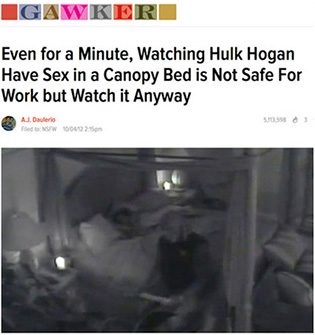
In an October 9 post, Walters reported on the final minutes of one of the Hogan videos. “Moments after the deed is done and Hulk leaves,” Walters wrote, Todd Clem entered the bedroom and declared, “If we ever did want to retire, all we’d have to do is use this footage.” The TMZ story added that Heather Clem replied, “You’d never do that.” Her husband concurred, saying, “I wouldn’t do that, you’d be the biggest rat, you’d be dead.”
Walters reported that Clem considered the video a possible “goldmine” that could feather his post-radio retirement. The Walters story left TMZ readers with the impression that the Clems believed the tape’s value was rooted in its depiction of the paunchy Hogan, then in his mid-50s, having sex.
But Walters curiously omitted the final six words of Clem’s quote. They were not only the most newsworthy part of the sex tape, but posed an existential threat to Hogan’s career if published. When Clem entered his bedroom after Hogan departed, he said, “If we ever did want to retire, all we’d have to do is use this footage of him talking about black people.” The shock jock was referring to racist comments--which included use of the N-word--that the wrestler made after trysting with Heather Clem.
By excluding any reference to Hogan’s racist remarks, Walters had spared the wrestler a career implosion. Perhaps this was a classic tabloid “catch and kill” for a preferred source/subject of stories. Walters was so close to the Hogan camp that the wrestler’s attorney later told the FBI that he wanted to keep the TMZ producer’s “identity confidential because he is a good source of information.” This was on top of the fact that Walters’s father had explored going into business with Hogan’s son.
But maybe Walters had another reason for not publicly exposing Hogan’s “talking about black people.”
According to Loyd, who sold TMZ the Hogan sex tape excerpts, Walters recommended that the radio host hire a “good friend” of his: Keith Davidson. The lawyer, Walters explained, was experienced in negotiating the sale of sex tapes back to celebrities. Loyd recalled Walters saying that Davidson was “real solid” and “keeps everything on the low, nothing will ever get out, your name won’t get out.”
Loyd said that before Walters gave him Davidson’s contact details, the TMZ employee delivered an admonition: “If you ever tell anybody that I gave you this information, I’ll deny it to the bitter end.” Recalling that conversation with Walters, Loyd now says, “Looking back on it, it seems particularly odd.”
Nearly simultaneously, Walters had covered up for Hogan on TMZ and then effectively sicced Davidson on the wrestler. It was an audacious heel turn.
Loyd first called Davidson on October 10, a day after TMZ published Walters’s story on the Hogan sex tapes. Before dialing the lawyer, Loyd blocked his Florida number. Davidson made a persuasive pitch to Loyd about his experience handling similar sex tape matters. Vouched for by Walters, Davidson seemed like a “big swinging dick attorney from Beverly Hills” who “talked a big game,” said Loyd.
Believing that any future sale of the Hogan tapes would be a “completely legal thing” negotiated by a lawyer who “does this all the time,” Loyd hired Davidson. The plan was for Davidson to try and negotiate a settlement with Hogan’s representatives, while keeping the identity of his client secret.
Tweet
Keith Davidson
TAGS
Keith Davidson, sex tape, Donald Trump, TMZ, Karen McDougal, Hollywood, Stormy Daniels, Charlie Sheen, Hulk Hogan, porn, Mike Walters
Page 4 of 4
But from the outset of Davidson’s representation, Loyd said, there were red flags.
When Loyd told Davidson that he bought the sex tapes at a Clem “garage sale,” the lawyer rejected that story. Instead, Davidson suggested an alternative account: Loyd found the videos on a used laptop he had purchased. Loyd said that when he told Davidson that was not true, the attorney stressed that the laptop story was the one they were using. “I was like, okay, maybe this guy knows what he’s doing,” Loyd recalled. “He’s the attorney here.”
Citing attorney-client restrictions, Davidson would not answer TSG questions about the Hogan sex tape case.
After speaking with Loyd, Davidson immediately sent David Houston, Hogan’s attorney, an e-mail with the subject line “Hulk Hogan Tape.” Davidson asked Hogan’s lawyer to “call me regarding above.” After Houston’s assistant replied seeking further information (“Mr. Houston is unaware of whom you might be”), Davidson explained that he had been asked to represent the “rights holder” of the Hogan footage and wanted to discuss the matter. Hogan’s lawyer agreed to a phone conversation, but wrote Davidson to say that his client was secretly taped, had never given consent to the video’s distribution, and was “distraught” over the Gawker leak.
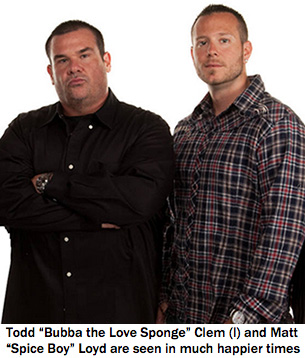
The two lawyers spoke multiple times over the next few days. In subsequent sworn testimony and interviews with federal investigators, Houston said that Davidson described the Gawker leak as a “warning shot” fired by his clients. Houston claimed that Davidson made other “not so quite veiled threats.”
Davidson’s alleged “warning shot” comment was flagged by investigators, one law enforcement source told TSG, because it seemed indicative of “an intent to extort.” Davidson denies making the “warning shot” comment.
Five days after receiving Davidson’s initial e-mail, Hogan and Houston, whose office is in Reno, Nevada, traveled to the FBI office in Clearwater, Florida. Hogan detailed his sexual encounters with Heather Clem and assured agents that the sex tape leak was not a publicity stunt. The wrestler said that he wanted “to prosecute whoever did this,” according to an FBI memo. Houston told agents about his contacts with Davidson. The Beverly Hills attorney, he said, “claimed that the possessors of the tapes obtained them legally as they purchased a laptop which contained said images/tapes.” Houston also said that Davidson told him that Hogan used racial epithets in one tape, and that if the video was released, it would damage the wrestler’s career.
On the same day that Hogan and Houston met with the FBI, the wrestler sued Gawker for $100 million, charging that the posting of the sex tape excerpt was an invasion of privacy that left him humiliated and stricken with severe emotional distress. It would emerge years later that Hogan’s massive legal bills were paid by Peter Thiel, the tech billionaire who for years nursed a grudge against Gawker, which he branded a “singularly terrible bully.”
It seems just as likely, however, that Hogan’s lawsuit was an attempt to halt any future release of the N-word video (by Gawker or any other outlet). Through conversations with Davidson--and apparently Walters, too--Houston and Hogan already knew of the damaging video’s existence. In an October 12 text to a friend, a concerned Hogan wrote that “there’s more than one tape out there and a one that has several racial slurs we’re told.”
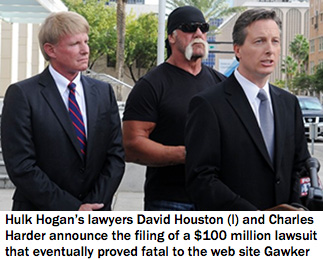
After consulting with a federal prosecutor, FBI agents opened an extortion investigation targeting Davidson (and his unknown clients) one day after Hogan and Houston filed their in-person complaint. Houston gave agents his e-mail correspondence with Davidson and agreed to record phone conversations with the California attorney. As he commenced cooperating with the FBI, Houston had no idea that Walters--a valuable source of information for Hogan's team--was responsible for connecting Davidson with Loyd, possessor of the sex tapes.
When asked about being played by Walters, Houston said he was shocked to subsequently learn that the TMZ employee was the “referral source between these goons and Davidson. It was pretty disappointing.” He added, “We have people actually referring clients, people that are media people. And I know they’re creating a story...that lubricates the wheel that runs their business. But, really?”
Documents from the FBI’s undercover investigation, a related state criminal probe, and the Gawker civil litigation paint a devastating portrait of Davidson as a lawyer who allegedly directed his clients to lie in an effort to facilitate a six-figure settlement from Hogan. Walters does not fare much better.
In a series of calls recorded over two months, some of which he placed from an FBI field office, Houston pretended to negotiate an actual settlement with Davidson. Transcripts of the calls provide a glimpse into Davidson’s approach in handling a deal for sex tapes, which he referred to as “the product” in one call. The transcripts also show Houston, who has practiced since 1978, trying to lead Davidson into making incriminating statements. But Davidson remained circumspect and issued none of the “veiled threats” that Houston attributed to him during their initial conversations (which were not taped).

Davidson told Houston, “I’ve been a fan of your client for years,” adding that Hogan “seems like just a really, really nice guy who was going through a really bad part in his life.” After declaring that, “I hope that you and I are dealing in a professional way that is truthful, open, candid,” Davidson told Houston it was “not my intention here to hold anybody over the fire...You know, I hope I’m part of the solution here.” At one point, Davidson even described one of Hogan's encounters with Heather Clem: “The sex is pretty straight. I mean...there’s nothing that would be even remotely unusual or fetish-like.”
In one recorded call, Davidson pushed Houston to commence monetary negotiations. “Alright then I’ll say a dollar,” Hogan’s lawyer said. Davidson, who chuckled at the opening offer, responded, “Well, I think that we would counter with, with a million dollars.” As the lawyers eventually hammered out the final details of a $300,000 settlement agreement, Davidson balked at certain language proposed by Houston, whose efforts negotiating the sham agreement were being overseen by the FBI. “You’re almost asking my client to admit that she’s an extortionist,” said Davidson. “My client puts, puts a signature on this, I think that’s an admission of criminal wrongdoing.”
During his conversations with Houston, Davidson said that his clients were responsible for providing Gawker with the leaked Hogan sex tape. This claim was crucial since it provided some assurance that the tapes being offered for sale were originals (and that copies had not been made).
It was also not true, according to Davidson’s clients.
With Loyd desiring anonymity, his friend Lori Burbridge--whom he previously used to receive the $8500 payment from TMZ--was set to act as the owner of the tapes. Burbridge, who faced financial problems and just had her car repossessed, agreed to be the straw seller in return for $10,000. Davidson’s plan called for Burbridge to accompany him to a future settlement meeting with Hogan and Houston.
During a conference call between Davidson, Loyd, and Burbridge, the subject of the Gawker leak was discussed. In an interview, Loyd recalled repeatedly telling Davidson that he had nothing to do with providing the tape to the web site. Davidson, he said, replied, “We have to admit it. You won’t be held responsible for anything.”
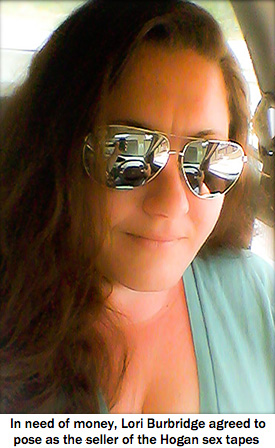
Burbridge, in an interview with state investigators, said that Davidson told her that, “I needed to say...that I was the one who sold the video to Gawker.” She added that Davidson “advised us explicitly that if we didn’t claim to have done that, to have sold to the Gawker, that the whole deal possibly wouldn’t go through.” If they did not claim responsibility for the leak, Burbridge told federal agents, “the sex tapes would lose their value.”
While later describing the conference call with Davidson to FBI agents, Burbridge said that she asked the lawyer if “the selling of the tapes was extortion.” Davidson, she said, replied that he had frequently done similar deals and that “the tapes were purchased and property that is purchased” can be legally resold. When an agent asked Burbridge why she thought to ask Davidson about extortion, she answered that the sex tapes “could hurt [Hogan] and they were trying to get [Hogan] to pay for it.” Burbridge, an FBI reports notes, “further stated that’s what she understood extortion to be.”
During the conference call, Davidson told Loyd and Burbridge that Hogan’s lawyer was demanding that Davidson’s client submit to a polygraph test on the day of the settlement meeting. Burbridge told the FBI that “Davidson knew Loyd did not release the material to Gawker and reassured everyone that the deal would still go through” even if she failed the polygraph. Burbridge told state investigators that she felt Davidson’s statement about the unimportance of the polygraph “came across as an overconfidence on his part.” The polygraph, Burbridge said, “was one of my big concerns because I was going in there with this big lie that I’m trying to pass as true that we were the ones that provided it to Gawker.”
With a negotiated agreement in place, Houston and Davidson arranged to meet--along with their respective clients--at the Sandpearl Resort in Clearwater Beach to close the deal. Davidson, whose contingency fee arrangement called for him to receive 40 percent of the settlement ($120,000) plus expenses, arrived in Florida a day early so that he could meet his clients face-to-face for the first time. Davidson had no idea that a squad of FBI agents was already inside the hotel outfitting Houston’s room with video cameras and listening devices. Or that those agents would be massed in an adjoining room monitoring his meeting with Hogan and Houston.
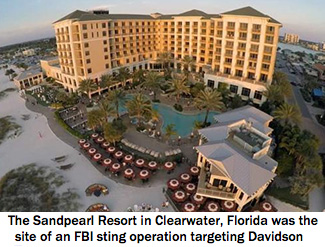
The settlement agreement Davidson carried with him included the admission that his clients had provided Gawker with one of the sex tapes. The document was a template Davidson had used in other celebrity cases (and would employ in the Stormy Daniels matter). In earlier versions of the sex tape agreement Davidson shared with his clients and Houston, remnants from unrelated agreements remained in the document. Loyd recalled thinking, “This guy didn’t even customize a contract? He’s got a fucking template?”
During a dinner with Burbridge, Loyd, and Loyd’s wife, Davidson mentioned his various celebrity cases, saying he had just done a sex tape deal with Kanye West. At the end of the evening, Loyd gave Davidson the three Hogan DVDs. As part of the settlement agreement he had prepared, Davidson attached an exhibit describing the contents of the sex tapes in great detail. Writing like an overly enthusiastic blogger doing a TV recap, Davidson noted that Hogan could be seen lying in bed as Heather Clem “goes nuts giving oral.” On another tape, Davidson’s synopsis reported that Hogan was “breathing heavy Oh Fuck Im gonna cum oh fuck--suck my dick breathing heavy moans, orgasm.”
On the morning of the meeting with Hogan and Houston, Burbridge and Davidson had a prep session in his hotel room. Burbridge later told FBI agents Davidson reminded her of their phony claim about how the tapes were acquired: She “had bought a computer bag which contained the [Hogan] sex tapes.” Davidson, she recalled, said this in a “wink wink, nudge nudge” fashion. Burbridge described Davidson as “very adamant of trying to do everything to get the deal to go through,” which, she thought, was “so that he’d get his cut.” Burbridge told law enforcement officials that the lawyer had earlier said, “I don’t know about the, you know, you saying you bought it at a garage sale. What about you bought a laptop and it was in there?” The location of where the DVDs were purportedly found fluctuated from on a laptop to inside a laptop bag.
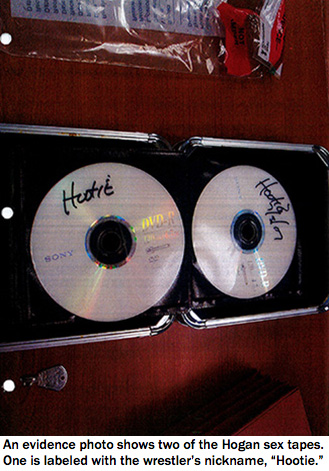
While Burbridge waited behind, Davidson arrived at Houston’s room at 11 AM. “It’s good to meet you. I’m sorry under these circumstances,” he told Hogan. “Yeah,” the wrestler responded. “At the end of the day...it’s our intent that these things go away, they go away forever,” Davidson then assured Hogan.
As the meeting progressed, Davidson again confirmed that his client was Gawker’s source. He also came under pressure from Houston to answer whether the tapes had been stolen from Clem. At that point, Davidson asked Houston if they could speak in private in the bathroom. Houston agreed. Inside the bathroom, Davidson admitted that the sex tapes came from a former employee of Clem who hated the shock jock. “I don’t know if they’re stolen,” said Davidson. “And, quite frankly, I don’t want to know if they were stolen.”
While Davidson made this admission out of earshot of a witness, Hogan, Houston was carrying an FBI recording device in his pocket. Perhaps Davidson should have turned on the faucets before declaring that he was unaware whether he was arranging the sale of stolen goods.
Davidson referred to the ex-Clem employee as “Mr. X.” and said that Burbridge was acting as the mystery man’s representative. After Davidson brought Burbridge into Houston’s room, she told Hogan that “Mr. X” was behind the Gawker leak. When Houston asked, “Why wasn’t the racial stuff released?” Burbridge answered, “The intent wasn’t to harm you...if that was released then what is it worth to you as well?” “Nothing,” Hogan replied.
According to an FBI report, Hogan and Houston then went to Davidson’s room to authenticate the sex tapes while Burbridge was questioned by a polygrapher (an ex-FBI agent who was aware of the sting operation). While viewing the tapes, Houston said, Davidson made a comment to the effect that, “The tapes that were released were the shot over the bow, but not the shot that would take the ship down.” A report by the polygrapher quoted Davidson saying he had previously handled 30 similar settlements, with only one “gone bad.”
That latter number was about to double.
The group moved on to signing multiple copies of the settlement agreement. Davidson handed over a silver case containing the three DVDs. And Houston gave Davidson a check for $150,000, the first of three installment payments. Then the front door and the door into the adjoining room opened and in flooded FBI agents. Hogan and Houston left, while Davidson and Burbridge were separated by agents.

Burbridge was bewildered and repeatedly asked whether she was "part of a hoax,” an FBI report notes. She also wondered whether the raid “was a bit” for Loyd’s radio show. After assuring her that the raiding party was composed of legitimate lawmen, an FBI agent read Burbridge her rights. She then agreed to cooperate with agents and began by saying that “the most important thing” the FBI needed to know was that she and Loyd “were not responsible for the Gawker sex tape leak.” That false claim, said Burbridge, was made “in order to complete the negotiations” with Hogan and Houston.
Davidson, who was not arrested, was accused of extortion by agents trying to spook the lawyer into answering questions. After being played some of the FBI’s surreptitious recordings, Davidson departed the hotel. Loyd, who was with his pregnant wife at a mall, learned of what occurred at the Sandpearl when he texted Davidson for an update. “FBI raided,” Davidson wrote. “You need to get an attorney.” Loyd replied, “You are my attorney.” “Conflict,” Davidson answered.
Davidson quickly hired Brian Albritton, a white collar defense lawyer who once served as United States Attorney for the judicial district that includes the Tampa-St. Pete area. Albritton would compile a 58-page presentation for federal prosecutors that described Davidson as an “ethical and trustworthy attorney” who negotiated a legitimate commercial deal with Hogan’s lawyer, a transaction that was absent “any threat or similar coercive inducement.”
Albritton also contended that a prosecution of Davidson might turn into a publicity vehicle for Clem and Hogan, both of whom would likely be called as government witnesses. Arguing that a criminal trial over the Hogan sex tapes would promote “Disrespect for Federal Law Enforcement,” Albritton concluded that the public would view “any such prosecution as a waste of taxpayer dollars and wish a pox on both Hulk Hogan and Bubba the Love Sponge.”
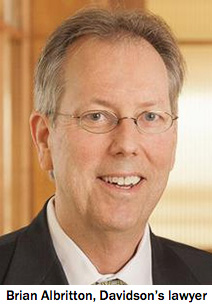
For good measure, Albritton included a page detailing some of the shock jock’s more vile radio outrages. The page was headlined “Bubba brings the Circus--A History of Obscenity & Lies.” Albritton was unaware at the time that Clem’s untruths also included his claim during an FBI interview that Hogan was aware he was being recorded having sex with the shock jock’s wife. Clem was never charged for this lie to federal agents.
After seven months reviewing the evidence against Davidson, federal prosecutors decided not to file charges against the lawyer. The Department of Justice does not comment on what factors contribute to such declinations. Houston argued that government lawyers “had more than ample evidence” to prosecute Davidson. “That’s a conspiracy in anybody else’s county or district,” Hogan’s attorney declared. “For some reason Florida, I guess, that doesn’t amount to a conspiracy.”
Tampa police and state prosecutors would later examine the Hogan case, aided by the FBI’s recordings and other evidence. Matt Smith, a division chief with the State Attorney’s Office, was in favor of prosecuting Davidson and Loyd on conspiracy to commit extortion and dealing in stolen property charges. But while state investigators believed that a crime had been committed, they were not confident in the likelihood of conviction, said Smith, who was particularly concerned about the prospect of using Clem as a witness. He added, “A lot of jurors would be like, ‘Why the fuck do we care? Are you kidding me? We’re here because this guy’s fucking this guy’s wife on camera and didn’t know that he was getting filmed?’”
Albritton also met with state prosecutors and contended that a Davidson prosecution would stain the legal system. That pitch had little resonance, Smith said. The Florida prosecutor laughed, “We have stuff all the time that’s nonsense.”
Like their federal counterparts, Smith’s superiors ultimately declined to pursue criminal charges against Davidson.
* * *
It has been almost three years since Davidson walked away from the wreckage of the Hogan sex tape sting. But he remains shadowed by his activities in Florida.
In May 2016, two months after Hogan won a $140 million jury verdict against Gawker, the wrestler filed a lawsuit accusing Davidson, Loyd, Burbridge, and other defendants of extortion and invasion of privacy. Despite driving Gawker into the grave, Hogan was not done seeking retribution. He wanted to identify the source of a July 2015 National Enquirer story that disclosed the contents of the sex tape in which he made racist comments. The Enquirer story prompted World Wrestling Entertainment to immediately fire Hogan.
When TMZ reported that WWE was cutting ties with Hogan, its story included the “exclusive details” that “TMZ has seen the tape” on which Hogan “repeatedly used the n-word.” The site, of course, did not mention that it first saw the tape nearly three years earlier, but chose not to disclose its content. Amusingly, when TMZ founder Harvey Levin appeared at a tech conference in mid-2016, he was asked about the sex tape that sunk Gawker. “We were offered that tape, and we turned it down,” Levin claimed. “It wasn’t right for us. It felt invasive to us.” The 67-year-old Levin apparently forgot about paying $8500 to “Spice Boy” Loyd for footage of Hogan having sex with Heather Clem.

Davidson, representing himself in the Hogan II case, last month lost a motion to compel arbitration and stay the court proceedings. On March 23, he filed a five-page motion to dismiss Hogan’s lawsuit. Like the Hogan-Gawker lawsuit--during which Davidson was often referred to simply as “the extortionist”--the ongoing Hogan II case has been the source of more lumps for the L.A. attorney. During a recent hearing, Hogan lawyer Kenneth Turkel described Davidson as a “now disbarred lawyer” who was hired to “essentially shake down my client and extort him and threaten him.”
In addition to the Hogan litigation, Davidson is a defendant in two other civil matters accusing him of extortion: the action brought by the L.A. waiter who says he helped arrange the Pacquiao-Mayweather fight and a lawsuit filed in late-2017 by Robert Herjavec, one of the panelists on ABC’s “Shark Tank.” Herjavec, 55, alleges that Davidson conspired with Danielle Vasinova to try and secure a multimillion dollar hush money payment. Herjavec claims that Vasinova, a former girlfriend, and Davidson threatened to accuse him of sexually battering the 35-year-old woman and giving her herpes. Herjavec also reported receiving a legal demand letter from Davidson that threatened to expose the “graphic details” of the businessman’s “deviant sexual fantasies and escapades.”
If the Hogan II lawsuit survives Davidson’s dismissal motion, the lawyer will likely have to face a deposition by the wrestler’s legal team. This was an unpleasantness that Davidson was able to avoid in the Hogan-Gawker litigation. On the eve of trial, the web site’s attorneys sought to subpoena Davidson, an effort that his counsel fought off, in part by asserting the lawyer’s Fifth Amendment privilege against self-incrimination.
But if Davidson had been compelled to answer questions under oath, he was prepared to object to one specific Gawker request. The lawyer did not want his deposition to be videotaped. Davidson considered the prospect of being filmed to be “unnecessary and meant merely to harass.” Also, he figured the tape would be leaked somewhere online.
Tweet
Keith Davidson
http://www.thesmokinggun.com/documents/ ... ile-907453 
